Discover DNP


How to write an NP personal statement plus 9 Successful NP Personal Statement Examples
So, you’re applying to NP programs? Awesome! Let’s talk about something that might be giving you a bit of a headache: the NP personal statement. Getting into a top NP program is competitive, and you want every part of your application to be top-notch. Maybe you’ve got great grades, a solid GRE score, and some killer recommendations. That’s fantastic! But don’t forget about that personal statement. In this guide, we’re going to break it down for you. We’ll show you how to write a personal statement that really stands out and give you nine Successful NP Personal Statement Examples. We’ll give you some steps to follow and point out some common mistakes to avoid.
What you'll Learn
How to write an NP personal statement
Writing a strong nurse practitioner (NP) personal statement is crucial for your nursing school application. This guide will walk you through the five-paragraph essay format, provide examples, and offer tips to make your NP personal statement stand out.
The Five-Paragraph Essay Format for NP Personal Statements
Introduction.
Begin with a compelling hook that captures the reader’s attention. This could be a meaningful patient interaction, a pivotal moment in your nursing career, or a personal experience that led you to pursue advanced practice nursing. Briefly introduce yourself and state your intention to become a nurse practitioner.
Example: “The rhythmic beeping of monitors in the ICU faded into the background as I held the hand of a critically ill patient, realizing that my role as an RN, while vital, had limitations. This moment crystallized my aspiration to become a family nurse practitioner, a goal that has led me to apply to your esteemed FNP program.”
Program Fit
Explain what attracted you to the specific NP program and field. Demonstrate your knowledge of the program’s strengths and how they align with your goals.
Example: “Your acute care NP program’s focus on evidence-based practice, advanced pharmacology, and hands-on clinical experiences aligns perfectly with my career aspirations. The curriculum’s emphasis on interprofessional collaboration and cutting-edge research in critical care excites me, as it will provide the knowledge and skills necessary to excel as an ACNP in high-acuity settings.”
Goals – Short-term and Long-term Goals
Compare your short- and long-term goals with the program goals. Be specific and show how the program will help you achieve these objectives.
Short-term goals example: “My immediate goal is to develop advanced clinical skills in diagnosing and managing complex health conditions across the lifespan. I aim to gain proficiency in advanced health assessment, pharmacology, and pathophysiology to provide comprehensive, patient-centered care as a family nurse practitioner.” Long-term goals example: “Long-term, I aspire to work in a community health setting, focusing on chronic disease management and health promotion. I plan to develop innovative care models that integrate telemedicine to improve access for underserved populations. Additionally, I aim to pursue a DNP to contribute to nursing education and policy development.”
Skills and Experiences
Share your relevant skills, experiences, and characteristics that make you an ideal candidate for the NP program.
Example: “With five years of experience as an RN in both medical-surgical and emergency department settings, I bring a strong foundation in clinical practice and critical thinking. My role as a charge nurse has honed my leadership and interprofessional communication skills. Additionally, my volunteer work at a local free clinic has deepened my understanding of healthcare disparities and reinforced my commitment to serving vulnerable populations.”
Summarize your key points and reaffirm your commitment to becoming an NP and contributing to the field of advanced practice nursing.
Example: “My journey from BSN to experienced RN has prepared me well for the challenges and rewards of becoming a nurse practitioner. I am excited about the opportunity to further my education and expand my scope of practice at your esteemed institution. With your program’s support, I am confident that I will become a skilled, compassionate, and innovative NP, ready to meet the evolving healthcare needs of our communities.”
Common Mistakes to Avoid in NP Personal Statements
- Generic statements: Avoid clichés like “I’ve always wanted to be a nurse.” Instead, provide specific examples that illustrate your passion for nursing and motivation to become an NP.
- Focusing too much on academic achievements: While important, your GPA and test scores are already in your application. Use the personal statement to showcase your unique experiences and qualities.
- Neglecting to show personal growth: Discuss how your experiences have shaped you and prepared you for advanced practice nursing.
- Poor writing quality: Ensure your statement is well-written, free of grammatical errors, and flows logically.
- Failing to address the specific program: Tailor your statement to each school, demonstrating your knowledge of and interest in their particular NP program.
Personal Goal Statement for NP School
A personal goal statement for NP school is a focused version of your personal statement that specifically outlines your professional objectives. It should clearly articulate why you want to become an NP and how the program will help you achieve your goals.

Example of a Personal Goal Statement for Northeastern NP Program:
“My goal in pursuing the Adult-Gerontology Primary Care Nurse Practitioner program at Northeastern University is to develop the advanced clinical skills and knowledge necessary to provide comprehensive, patient-centered care to adult and older adult populations. Northeastern’s emphasis on population health and innovative care delivery models aligns perfectly with my aspiration to improve health outcomes for older adults in urban settings. Long-term, I aim to leverage the leadership and research skills gained from this program to develop and implement community-based interventions that address the complex health needs of aging populations, particularly in underserved communities.”
Using Medical Terminology in NP Personal Statements
Incorporating appropriate medical terminology in your NP personal statement can demonstrate your clinical knowledge and familiarity with advanced practice nursing. However, it’s crucial to use terminology correctly and in context. Here are some examples:
- Instead of saying “I helped patients with heart problems,” you could write: “I provided care for patients with acute myocardial infarction and congestive heart failure, gaining valuable experience in cardiac assessment and management.”
- Rather than “I worked with diabetic patients,” consider: “I developed expertise in the comprehensive management of patients with Type 2 diabetes mellitus, including medication titration, blood glucose monitoring, and patient education on lifestyle modifications.”
- Instead of “I want to work in women’s health,” you might say: “I am passionate about women’s health and aspire to provide comprehensive care across the reproductive health spectrum, from contraceptive counseling and prenatal care to menopause management and preventive screenings.”
While medical terminology can enhance your NP personal statement, it’s essential to maintain a balance. Your statement should be accessible and convey your personal experiences and motivations.
Writing a compelling NP personal statement requires careful thought, preparation, and attention to detail. By following the five-paragraph essay format, avoiding common mistakes, crafting a clear personal goal statement, and appropriately incorporating medical terminology, you can create a standout personal statement that effectively communicates your qualifications, aspirations, and fit for the NP program of your choice. This well-crafted statement will be a crucial component of your nursing school application, helping you take the next step in your journey to becoming a nurse practitioner.
NP Personal Statement Examples
Fnp personal statement example .
The family sat before me, their health challenges intertwined like a complex tapestry – from the grandmother’s poorly controlled diabetes to the children’s asthma exacerbated by poor living conditions. This moment in the community health clinic crystallized my understanding of the profound impact a skilled Family Nurse Practitioner could have on an entire family’s health trajectory. It is this realization that fuels my passion to become an FNP and brings me to your esteemed program. Your FNP program stands out for its comprehensive curriculum, focus on evidence-based practice, and commitment to addressing health disparities. I’m particularly drawn to your program’s emphasis on population health and community engagement. The opportunity to participate in community health initiatives and learn from faculty who are leaders in primary care research is truly exciting. Moreover, your focus on integrating behavioral health into primary care aligns with my holistic view of patient care. In the short term, my goal is to develop the advanced clinical skills and knowledge necessary to provide comprehensive, patient-centered care as a Family Nurse Practitioner. Long-term, I aspire to work in a community health setting, where I can build long-term relationships with patients and focus on health promotion and disease prevention across the lifespan. I’m particularly interested in developing innovative approaches to chronic disease management and health education that empower patients to take an active role in their health. These goals align seamlessly with your program’s mission of preparing FNPs to meet the complex healthcare needs of individuals and families. With six years of diverse nursing experience, including work in a busy medical-surgical unit and a community health clinic, I bring a solid foundation in clinical practice and a nuanced understanding of the challenges facing our healthcare system. My experience has honed my clinical skills, cultural competence, and ability to provide high-quality care in resource-limited settings. I’ve also developed strong leadership and interprofessional collaboration skills, often taking on charge nurse responsibilities and coordinating care across multiple disciplines. In conclusion, my journey from novice nurse to experienced RN has prepared me well for the challenges and rewards of becoming a Family Nurse Practitioner. I am excited about the prospect of joining your program and taking the next step in my professional evolution. With your program’s support, I am confident that I will become a skilled, compassionate, and innovative FNP, ready to meet the complex healthcare needs of individuals and families across the lifespan and contribute to improving community health outcomes.
Duke Personal Statements NP example
“Health is a state of complete physical, mental and social well-being, and not merely the absence of disease or infirmity.” This WHO definition resonated deeply as I coordinated care for a patient struggling with multiple chronic conditions and significant socioeconomic barriers. This experience, among many others in my nursing career, has crystallized my goal of becoming a Family Nurse Practitioner and led me to apply to Duke University’s prestigious NP program. Duke’s program stands out for its innovative curriculum, world-class faculty, and commitment to advancing health equity. I’m particularly drawn to your emphasis on evidence-based practice and translational research. The opportunity to engage in cutting-edge research at one of the nation’s top academic medical centers is truly exciting. Moreover, Duke’s focus on interdisciplinary collaboration aligns with my belief in the importance of team-based healthcare, which I’ve seen firsthand dramatically improve patient outcomes. My immediate goal is to gain the advanced knowledge and skills necessary to provide comprehensive, evidence-based care across the lifespan as a Family Nurse Practitioner. Long-term, I aspire to work in a community health setting, where I can provide primary care while also engaging in population health initiatives. I’m especially interested in developing innovative models of care that integrate preventive services, chronic disease management, and behavioral health care. These goals align closely with Duke’s vision of “Advancing Health Together” and its commitment to preparing healthcare leaders. With seven years of diverse nursing experience, including work in a level I trauma center and a community health clinic serving underserved populations, I bring a strong clinical foundation and a deep understanding of the complex challenges facing our healthcare system. My experience has honed my clinical skills, critical thinking abilities, and capacity to provide culturally competent care to diverse populations. I’ve also developed strong leadership skills, often taking on charge nurse responsibilities and mentoring new graduates. In conclusion, my journey from BSN to experienced RN has prepared me well for the rigors and rewards of Duke’s NP program. I bring to your program a strong clinical foundation, a passion for lifelong learning, and a commitment to advancing the nursing profession. I am excited about the prospect of joining the Duke family and contributing to its legacy of excellence in healthcare education and research. With the support of Duke’s exceptional program, I am confident that I will become a skilled, compassionate, and innovative Nurse Practitioner, ready to lead in the rapidly evolving healthcare landscape.
NP School Personal Statement UThealth
The vast expanse of rural Texas stretched before me as I drove to my next home health visit. In that moment, the healthcare disparities facing our state became starkly apparent. This realization, coupled with my experiences caring for patients with limited access to specialty care, has fueled my passion to become a Family Nurse Practitioner and brings me to UTHealth’s esteemed program. UTHealth’s NP program stands out for its comprehensive curriculum, world-class faculty, and commitment to addressing health disparities in Texas. I’m particularly drawn to your program’s emphasis on population health and community engagement. The opportunity to participate in UTHealth’s community health initiatives and learn from faculty who are leaders in public health research is truly exciting. Moreover, your focus on interprofessional education aligns with my belief in the importance of collaborative healthcare, which I’ve seen firsthand improve patient outcomes in resource-limited settings. In the short term, my goal is to develop the advanced clinical skills and knowledge necessary to provide comprehensive, patient-centered care as a Family Nurse Practitioner. Long-term, I aspire to work in a community health setting, where I can provide primary care while also engaging in population health initiatives. I’m particularly interested in developing innovative models of care that integrate telehealth technologies to improve access to care in underserved areas of Texas. These goals align seamlessly with UTHealth’s mission of “Innovate, Educate, and Care” and its commitment to improving health outcomes across our state. With five years of diverse nursing experience across Texas, including work in a busy Houston emergency department and a rural West Texas clinic, I bring a unique perspective on the healthcare needs of our state’s varied populations. My experience has honed my clinical skills, cultural competence, and ability to provide high-quality care in resource-limited settings. I’ve also developed strong leadership and interprofessional collaboration skills, often taking on charge nurse responsibilities and coordinating care across multiple disciplines. In conclusion, my journey across the diverse healthcare landscape of Texas has prepared me well for the challenges and rewards of becoming a Family Nurse Practitioner. I am excited about the prospect of joining the UTHealth family and contributing to its legacy of excellence in healthcare education and research. With the support of UTHealth’s exceptional program, I am confident that I will become a skilled, compassionate, and innovative Nurse Practitioner, ready to lead in addressing the complex healthcare needs of Texans and improving health outcomes across our state.
UCLA NP Program Personal Statement
The young mother’s eyes lit up with understanding as I explained her child’s asthma management plan. In that moment, I saw the profound impact that comprehensive, patient-centered care can have on a family’s health and wellbeing. This experience, one of many throughout my nursing career, has fueled my passion to become a Family Nurse Practitioner and led me to apply to UCLA’s renowned NP program. UCLA’s program stands out for its innovative curriculum, world-class faculty, and commitment to advancing health equity. I’m particularly drawn to your emphasis on integrating research into clinical practice and the opportunity to engage in groundbreaking research at one of the nation’s top academic medical centers. The program’s focus on interprofessional education aligns with my belief in the importance of collaborative healthcare, which I’ve seen firsthand improve patient outcomes in my current role. My immediate goal is to gain the advanced knowledge and skills necessary to provide comprehensive, evidence-based care across the lifespan as a Family Nurse Practitioner. Long-term, I aspire to work in a community health setting, where I can provide primary care while also engaging in population health initiatives. I’m especially interested in developing innovative models of care that integrate preventive services, chronic disease management, and behavioral health care. These goals align closely with UCLA’s vision of “optimizing health and wellbeing through discovery, innovation, and care.” With six years of diverse nursing experience, including work in a level I trauma center and a community health clinic, I bring a strong clinical foundation and a deep understanding of the challenges facing our healthcare system. My experience has honed my clinical skills, critical thinking abilities, and capacity to provide culturally competent care to diverse populations. I’ve also developed strong leadership skills, often taking on charge nurse responsibilities and mentoring new graduates. In conclusion, my journey from BSN to experienced RN has prepared me well for the rigors and rewards of UCLA’s NP program. I bring to your program a strong clinical foundation, a passion for lifelong learning, and a commitment to advancing the nursing profession. I am excited about the prospect of joining the Bruin family and contributing to UCLA’s legacy of excellence in healthcare education and research. With the support of UCLA’s exceptional program, I am confident that I will become a skilled, compassionate, and innovative Nurse Practitioner, ready to lead in the rapidly evolving healthcare landscape.
NP Application Personal Statement (Experienced RN)
“Prevention is better than cure.” This age-old adage took on new meaning for me one hectic night in the ER. As I treated a patient whose uncontrolled chronic conditions had spiraled into a life-threatening crisis, I realized that many such emergencies could be prevented with better primary care and patient education. This pivotal moment solidified my resolve to become a Nurse Practitioner, a journey that brings me to your esteemed program. Your NP program’s comprehensive curriculum, with its focus on evidence-based practice and commitment to preparing NPs to serve diverse populations, aligns perfectly with my professional aspirations. I’m particularly drawn to the advanced pharmacology and diagnostic reasoning courses, as these areas are crucial for the expanded scope of practice I seek as an NP. The opportunity to engage in clinical rotations across various healthcare settings is exciting, as it will broaden my perspective and enhance my ability to provide comprehensive care. In the short term, I aim to develop the advanced clinical skills and knowledge necessary to provide high-quality, patient-centered care as a Family Nurse Practitioner. My long-term goal is to work in a primary care setting, focusing on preventive care and chronic disease management. I’m particularly interested in developing innovative approaches to patient education and health promotion, drawing on my experience with acute exacerbations to inform preventive strategies. These goals align seamlessly with your program’s mission of preparing NPs to address complex healthcare needs and improve community health outcomes. With over a decade of experience as an RN, including roles in intensive care and as a charge nurse in the ER, I bring a solid foundation in clinical practice and a nuanced understanding of healthcare systems. My years at the bedside have honed my clinical acumen, critical thinking skills, and ability to remain calm under pressure. Moreover, I’ve developed strong leadership and interprofessional collaboration skills, which I believe are essential for success as an NP. My experience has also deepened my commitment to patient advocacy and continuous learning in healthcare. In conclusion, my journey from novice nurse to experienced RN has prepared me well for the challenges and rewards of becoming a Nurse Practitioner. I am excited about the prospect of joining your program and taking the next step in my professional evolution. With your program’s support, I am confident that I will become a skilled, compassionate, and innovative Nurse Practitioner, ready to lead in addressing the complex healthcare needs of our communities and contribute to the advancement of the nursing profession.
Example of Personal Statement for NP School (Career Changer)
The hospital corridor buzzed with activity as I shadowed a nurse practitioner during her rounds. As she expertly managed complex patient cases, I felt a surge of excitement and purpose. This experience, coupled with my personal journey of helping my father manage his Type 2 diabetes, ignited my passion for nursing and led me to make a bold career change from finance to healthcare. Now, as I apply to your Family Nurse Practitioner program, I am driven by a desire to make a tangible difference in people’s lives. Your FNP program’s emphasis on evidence-based practice, community health, and patient-centered care aligns perfectly with my vision of becoming a holistic healthcare provider. The program’s focus on developing strong clinical reasoning skills and fostering interprofessional collaboration particularly appeals to me, as I believe these are crucial for delivering high-quality care in today’s complex healthcare landscape. My immediate goal is to gain the advanced knowledge and clinical skills necessary to provide comprehensive primary care across the lifespan. Long-term, I aspire to work in a community health setting, where I can leverage my unique blend of financial and healthcare expertise to address not only the medical needs of patients but also the social determinants of health. These goals dovetail with your program’s mission of preparing FNPs to serve diverse and underserved populations. As a career changer, I bring a distinctive perspective to nursing. My background in finance has honed my analytical and problem-solving skills, which I’ve found invaluable in interpreting complex patient data and contributing to quality improvement initiatives. My experience in project management has made me an effective team leader, often taking on the role of charge nurse in high-stress situations. Moreover, my journey has taught me the value of perseverance, adaptability, and lifelong learning – qualities that I believe are essential for success as a nurse practitioner. In conclusion, my unconventional path to nursing has equipped me with a diverse skill set and a deep-seated passion for healthcare. I am excited about the prospect of joining your FNP program and taking the next step in my nursing journey. With your program’s support, I am confident that I will become an exceptional nurse practitioner, ready to make a meaningful impact on patient care and community health.
NP School Personal Statement Example
As I reflect on my journey in the nursing profession, I am filled with a sense of purpose and excitement for the next chapter of my career. My decision to become a nurse practitioner is rooted in my passion for providing exceptional patient care and my desire to make a lasting impact on the healthcare system. My nursing career began five years ago when I graduated with my BSN. Since then, I’ve worked in various settings, including the intensive care unit and primary care clinics. These experiences have not only honed my clinical skills but also deepened my understanding of the crucial role nurse practitioners play in delivering comprehensive care. One pivotal moment in my career occurred during my time as a charge nurse in the ICU. I was caring for a critically ill patient whose condition was rapidly deteriorating. As I coordinated with the healthcare team, I realized that my role as an RN, while vital, had limitations. I yearned for the ability to diagnose, prescribe, and manage patient care more autonomously. This experience solidified my goal of becoming a nurse practitioner. The NP program at your esteemed institution aligns perfectly with my career aspirations. Your curriculum’s focus on evidence-based practice, advanced pharmacology, and health assessment will provide me with the knowledge and skills necessary to excel as an NP. Additionally, your program’s emphasis on serving underserved populations resonates deeply with my personal mission to address healthcare disparities. As I embark on this journey, I bring with me a strong foundation in nursing, a commitment to lifelong learning, and a passion for patient advocacy. My experience as a charge nurse has honed my leadership skills, while my time in primary care has given me insight into the importance of preventive care and patient education. I am particularly drawn to the role of family nurse practitioner because it allows me to provide care to individuals across the lifespan. I believe that by focusing on health promotion and disease prevention, NPs can significantly improve patient outcomes and reduce healthcare costs. In conclusion, my journey from BSN to RN to aspiring NP has been marked by growth, challenge, and an unwavering commitment to nursing excellence. I am excited about the opportunity to further my education and expand my scope of practice. With your program’s support, I am confident that I will become a skilled, compassionate, and innovative nurse practitioner, ready to meet the evolving healthcare needs of our communities.
Psych NP Personal Statement Sample
The young woman sat across from me, her eyes downcast, voice barely above a whisper as she described her struggle with depression. As her psychiatric nurse, I provided support and implemented her treatment plan, but I yearned to do more. This poignant moment solidified my decision to become a Psychiatric-Mental Health Nurse Practitioner (PMHNP), a journey that brings me to your esteemed program. Your PMHNP program stands out for its comprehensive curriculum, emphasis on evidence-based practice, and commitment to addressing mental health disparities in underserved communities. I am particularly excited about the opportunity to engage in clinical rotations that will expose me to diverse patient populations and treatment modalities. The program’s focus on integrating mental health care into primary care settings aligns perfectly with my vision of holistic, accessible mental healthcare. In the short term, I aim to gain the advanced knowledge and skills necessary to provide comprehensive mental health care, including psychopharmacology, psychotherapy, and diagnostic assessment. My long-term goal is to work in both inpatient and outpatient settings, specializing in child and adolescent psychiatry. I hope to contribute to research on innovative treatment approaches for youth mental health, particularly in the realm of trauma-informed care. These aspirations align closely with your program’s goals of preparing PMHNPs to be leaders in mental health care delivery and advocacy. My three years of experience as a psychiatric RN in an acute care setting have honed my clinical skills, communication abilities, and capacity to build trust with vulnerable populations. I’ve developed expertise in crisis intervention, medication management, and therapeutic communication. Additionally, my experience has deepened my understanding of the complex interplay between mental health, physical health, and social determinants of wellbeing. In conclusion, my journey from psychiatric RN to aspiring PMHNP has been driven by a deep commitment to mental health advocacy and a desire to provide the highest quality of care. I am excited about the prospect of joining your program and taking the next step towards becoming a psychiatric-mental health nurse practitioner. With your program’s support, I am confident that I will develop the advanced skills and knowledge necessary to make a significant impact in the field of mental health care.
APRN CV NP Personal Statement example
“It’s not just what you do, but how you do it.” These words, spoken by a grateful patient, encapsulate my approach to nursing and my motivation for advancing my career as a Nurse Practitioner. Throughout my journey from RN to APRN, I’ve witnessed the transformative power of patient-centered, evidence-based care. It is this experience that drives me to seek a position as a Nurse Practitioner at [Healthcare Organization]. [Healthcare Organization]’s commitment to innovation, community health, and interdisciplinary collaboration aligns perfectly with my professional values and aspirations. I’m particularly impressed by your organization’s focus on integrating primary care and specialty services, as well as your initiatives to address social determinants of health. The opportunity to contribute to these efforts while providing high-quality, comprehensive care is truly exciting. My immediate goal is to leverage my APRN skills to provide advanced, holistic care to a diverse patient population. Long-term, I aim to take on leadership roles in quality improvement and patient safety initiatives, contributing to the advancement of nursing practice and patient care standards. I’m especially interested in developing innovative approaches to chronic disease management and patient education, drawing on my experience in both acute and primary care settings. With over a decade of nursing experience, including my recent years as an APRN, I bring a comprehensive understanding of the healthcare landscape and the critical role of Nurse Practitioners. My areas of expertise include chronic disease management, preventive care, patient education, and interdisciplinary collaboration. I’m particularly proud of my work in developing and implementing a diabetes management program that resulted in a 30% improvement in HbA1c levels among our patient population. This initiative showcased my ability to translate evidence-based guidelines into practical, patient-centered interventions and to lead multidisciplinary teams effectively. In conclusion, my journey from RN to APRN has equipped me with the skills, knowledge, and passion needed to excel as a Nurse Practitioner at [Healthcare Organization]. I am excited about the prospect of joining your team and contributing to your mission of providing exceptional, comprehensive care to the communities you serve. With my clinical expertise, leadership skills, and commitment to patient-centered care, I am confident that I can make a significant impact in improving patient outcomes and advancing the nursing profession at [Healthcare Organization].
Frequently Asked Questions on NP Personal Statement
What is an np personal statement .
An NP personal statement is a written document that aspiring nurse practitioners submit as part of their nurse practitioner program application. This personal essay details their qualifications, experiences, career goals, and reasons for wanting to pursue a career as a nurse practitioner . It provides the admission committee with a comprehensive understanding of the applicant’s suitability for the NP program .
Why is the NP Personal Statement Important?
The NP personal statement is crucial because it allows applicants to showcase their unique qualities, experiences, and motivations. It helps the admission committee assess whether the applicant is a good fit for the nursing program and has the potential to succeed in the demanding field of nursing . A well-crafted statement can significantly enhance the chances of admission into competitive NP programs .
How Should I Start My Nursing Personal Statement ?
Begin your nursing personal statement with a compelling introduction that captures the reader’s attention. You could start with a personal anecdote, a powerful quote, or a defining moment that inspired your desire to become a nurse . This sets the tone for the rest of your essay and engages the reader from the outset.
What Should I Include in My NP Personal Statement ?
Your NP personal statement should include:
- Your motivation for wanting to become a nurse practitioner
- Your relevant education and experiences, including your time as a registered nurse (RN)
- Your understanding of the nurse practitioner career and its challenges
- Your career goals and how the NP program aligns with them
- Any personal qualities or skills that make you a strong candidate
Post navigation
Previous post.
How to Write an Excellent NP School Personal Statement
Find np schools.
For the 2023-2024 academic year, we have 140 NP schools in our database and those that advertise with us are labeled “sponsor”. When you click on a sponsoring school or program, or fill out a form to request information from a sponsoring school, we may earn a commission. View our advertising disclosure for more details.
“Try not to rush this statement. We recommend taking some time to reflect on your nursing career accomplishments, as well as situations that perhaps were learning situations that did not end favorably. Use these to reflect on your motivation and priorities and how they apply to the topic that the school has provided.”
Dr. Doreen Rogers, DNS, RN, CCRN, CNE, Assistant Professor of Nursing & Graduate Nursing Program Director at Utica University
Anyone who’s ever applied to a nurse practitioner program knows two things: careers in nursing are in high demand and graduate school admissions are competitive. Nurse practitioner careers are one of the fastest-growing occupations in the United States; in fact, the US Bureau of Labor Statistics (BLS 2023) predicts that 118,600 new NP jobs will be added to the economy between 2022 and 2032—a 45 percent increase.
So why are nurse practitioner admissions so competitive? A shortage of qualified nursing teaching faculty and an increasing number of retiring nurses are some possible reasons, according to CNN .
Despite these admissions barriers, a nationwide shortage of doctors is poised to restrict patients’ access to care. To address this problem, states are beginning to expand the scope of practice laws for nurse practitioners. The U.S. News & World Report shows that 22 states, the District of Columbia, and the Veterans Health Administration removed practice authority limitations for NPs, which resulted in expanded healthcare and decreased costs.
One thing is sure: applicants for nursing practitioner programs must put together flawless applications to rank high with an admissions committee. In addition, an aspiring nurse practitioner who wants to stand out and make a solid first impression needs to write an excellent nurse practitioner (NP) school personal statement.
To help out hard-working nurses who spend more time seeing patients than practicing academic writing skills, here are some tips for writing an excellent nurse practitioner (NP) school personal statement.
Follow the Five-Paragraph Essay Format
Drexel University has a video featuring several tips for writing a personal essay for admissions committees. The video recommends applicants organize their statements in a five-paragraph essay format and write no more than 500 words.
- First paragraph: Make an immediate impact in your introduction
- Second paragraph: Explain what attracted you to the program and field
- Third paragraph: Compare your short- and long-term goals with the program goals
- Fourth paragraph: Share your skills, experiences, and characteristics
- Fifth paragraph: Conclude by summarizing your five-paragraph essay
Drexel University also offers a downloadable infographic to illustrate what admissions committees are looking for in an applicant’s essay.
Write an Impactful Introduction
Pretty Nurse Ashley , a registered nurse who documented her experience getting into Vanderbilt University’s top-ranked nurse practitioner program, emphasizes the importance of an impactful introduction in a personal statement in her YouTube video:
That first sentence needs to be something spectacular, something that’s going to pull them in, so it needs to be very creative and something that’s going to get their attention. With your personal statement, you want to stand out from the other applicants. You want to create a story, create a vivid picture of who you are.
At a time when nursing schools are sending thousands of rejection letters to qualified applicants, Pretty Nurse Ashley’s advice to make a strong introduction is solid advice to help an applicant open their statement with what makes them unique.
Do Your Homework: Advice From an NP Career Coach
Renee Dahring is a nurse practitioner career coach , past president of the Minnesota chapter of the APRN Coalition, and a nursing university instructor with extensive experience in recruitment and admissions for nurse practitioner programs. When applying to NP schools, Ms. Dahring recommends that nurse practitioner applicants do their homework in three areas.
Show Your Commitment to Finish
Dahring said, “Every university wants its students to finish, especially in a nurse practitioner program. If you drop out, your spot in the NP cohort is empty. Mostly we like to know: ‘Have people thought this decision through?’”
In other words, when an NP program admission committee decides to admit a student, they are investing in that person to finish the program. Therefore, if it seems like a risky investment, they will not want to admit that individual.
Connect Your Career Goals to the NP Program’s Mission
“Understand what the program’s goals and missions are and align your personal statement with them. . .Also, consider the mission of the educational institution; most have a dedication to the underserved, but that will vary from place to place,” Dahring advised.
Addressing a program’s or an institution’s mission statement directly in a personal essay can catch the attention of an admission committee. They want to ensure that a person is a strong fit for their specific program. It’s also a benefit for applicants to be familiar with a school’s objectives and guiding philosophy, as it can help ensure that a program is the right fit for them.
Demonstrate Your Understanding of NP Scope of Practice Laws
Dahring also stated, “The other important thing is to have a really good understanding of the NP Scope of Practice Laws. . .You should have a clear idea of what you are allowed and not allowed to do in the states where you apply for NP school and intend to work as a nurse practitioner.”
NPs can practice more independently in some states than others—and a solid understanding of these regional nuances can inform one’s essay.
Take Time to Communicate Clearly
Above all, take the time to write and edit well. Admissions committees read through hundreds of personal statements, so communicating concisely and clearly can increase an applicant’s chances of admission to an NP program.
Dr. Doreen Rogers is an assistant professor of nursing and the graduate nursing program director at Utica University in New York. She advises applicants to use their best writing skills:
Remember, your personal statement is an opportunity for you to convey what motivates you and discuss your priorities as a healthcare professional while extending them to your future career as a nurse practitioner. Some aspects that are exceptionally important are the use of appropriate grammar, spelling, word selection, and sentence structure (including an introductory paragraph, transition sentences in between paragraphs, and a conclusion that ties everything together).
Dr. Rogers also recommended taking the time to communicate clearly: “Try not to rush this statement. Instead, we recommend taking some time to reflect on your nursing career accomplishments, as well as situations that perhaps were learning situations that did not end favorably. Use these to reflect on your motivation and priorities and how they apply to the topic that the school has provided.”

Rachel Drummond, MEd
On NPschools.com, Rachel Drummond has leveraged her extensive background in education and mindfulness to provide valuable insights to nursing professionals since 2020. She explores how mindfulness and movement can be incorporated into the demanding routines of nurses, emphasizing the importance of mental and physical well-being for increased resilience and effectiveness in the challenging field of nursing.
Rachel is a writer, educator, and coach from Oregon. She has a master’s degree in education (MEd) and has over 15 years of experience teaching English, public speaking, and mindfulness to international audiences in the United States, Japan, and Spain. She writes about the mind-body benefits of contemplative movement practices like yoga on her blog , inviting people to prioritize their unique version of well-being and empowering everyone to live healthier and more balanced lives.
Related Programs
- Top Online Clinical Nurse Specialist Programs
- Top Online DNP-Nurse Practitioner Programs
- Top Online MSN-Nurse Practitioner Programs
- Top Online RN-to-MSN Nurse Practitioner Programs
Related Posts
- Ask a Professor: Supervisory Requirements for NPs in California May 7, 2020 – Matt Zbrog
- Which U.S. States Have the Highest Demand for Nurse Practitioners? November 6, 2023 – Becca Brewer, MEd
- Resources for NPs: Guide to National & State Professional Associations May 6, 2022 – Matt Zbrog
- Guide to Nurse Practitioner Continuing Education Resources (2023-2024) – Contact Hours & Units November 27, 2023 – Becca Brewer, MEd
- Ask a Professor: How Florida’s NPs Are Fighting for Full Practice Authority July 13, 2020 – Matt Zbrog

7 Essential Topics To Include In Your Personal Statement
Nurse Practitioner (NP) programs often ask for a personal statement with your application. So, what exactly is a personal statement, and why does it matter so much?
A personal statement is an essay where you talk about yourself – your background, work experiences, why you want to become a nurse practitioner, and your goals for your career.
Here’s why it’s key to your application:
It shows who you are. Beyond grades and test scores, this essay lets you share your unique story. You can show the admissions team your personality, values, and what makes you a great candidate for their NP program.
It proves you can communicate well. Being able to clearly express yourself is crucial for nurse practitioners. Your personal statement lets you show that you can organize your thoughts and explain things well, skills you’ll need for both your studies and your career.
It explains your motivation. This is your chance to talk about why you want to be a nurse practitioner and how the program you’re applying to fits with your career plans. It’s your moment to share your passion for nursing and healthcare.
It highlights your experience. You can use the essay to shine a light on the healthcare work you’ve done, like nursing roles, volunteering, or research. This helps show you’re ready for the challenge of an NP program and a career in advanced nursing.
It sets you apart. When many applicants have similar backgrounds, a well-written personal statement can help you stand out. Sharing your unique experiences and viewpoints can leave a lasting impression on the admissions team.
7 Topics To Include In Your Personal Statement With Examples:

1. Your Motivation for Becoming a Nurse Practitioner
Start with a strong introduction that captures your passion for nursing and your reason for pursuing an advanced practice role. This could be a personal anecdote that illustrates your dedication to healthcare, patient care experiences that motivated you, or an encounter with a Nurse Practitioner who inspired you.
- Example 1: “Growing up, I witnessed firsthand the impact of health disparities in my community, which ignited my passion for nursing. A pivotal moment came when a nurse practitioner in our local clinic went above and beyond to care for my family. Her dedication inspired me to pursue a career where I could make a significant difference in people’s lives, especially in underserved areas.”
- Example 2: “My motivation to become a nurse practitioner was solidified during my work in a pediatric unit. Seeing children’s resilience in the face of illness, and realizing the profound difference that personalized, compassionate care can make in their recovery, drove me to seek a role where I could offer such care on a deeper, more autonomous level.”

2. Educational and Professional Background
Outline your academic achievements, especially those relevant to nursing and healthcare. Include any honors, awards, or scholarships. Also, detail your work experience, particularly in healthcare settings, emphasizing roles that have prepared you for advanced practice nursing. This could include leadership positions, special projects, or initiatives you were part of.
- Example 1: “ Earning my BSN with a focus on pediatrics, I graduated with honors and worked at a children’s hospital for over five years. This role deepened my skills in managing diverse pediatric conditions and honed my ability to communicate with young patients and their families effectively. My passion for child health care drives me to specialize further through a Nurse Practitioner program, aiming to enhance my impact on pediatric well-being.”
- Example 2: “I graduated summa cum laude with my BSN and actively contributed to research on geriatric care management. Working as a nurse in a community health center, I spearheaded a project to improve patient education for managing chronic conditions, which fueled my desire to advance my practice through an NP program.”
- Example 3: “After achieving my BSN, where I specialized in emergency care and graduated at the top of my class, I embarked on a career in a Level I Trauma Center. This fast-paced environment honed my decision-making skills and my ability to quickly adapt to changing situations, traits essential for the dynamic role of a Nurse Practitioner. My leadership capabilities were recognized when I was appointed as the head of the unit’s mentoring program for new nurses, a role in which I thrived by guiding others towards excellence in patient care.”

3. Clinical Skills and Experience
Highlight your clinical experiences and the skills you’ve developed. Be specific about the types of healthcare settings you’ve worked in (e.g., hospitals, clinics, community health), the medical specialities and patient populations you’ve served (e.g. pediatric, oncology, cardiology, surgery), and any specialized skills or certifications you have (e.g., ACLS, PALS).
- Example 1: “In my role as an RN in a cardiac care unit, I developed proficient skills in managing acute cardiac episodes and providing post-operative care. This experience, complemented by my ACLS certification, has prepared me for the acute care challenges I will face as a Nurse Practitioner.”
- Example 2: “My clinical rotation in a rural health clinic exposed me to a wide range of primary care issues, from managing chronic illnesses to delivering preventive care. This experience honed my ability to adapt to diverse healthcare settings and solidified my commitment to primary care as a Nurse Practitioner.”

4. Professionalism and Leadership
Demonstrate your commitment to professionalism and leadership in nursing. This could include involvement in professional organizations, volunteer work, leadership roles you’ve held, and how you’ve contributed to improving patient care or healthcare delivery.
- Example 1: “As a member of the Nursing Professional Development Committee at my hospital, I led initiatives to enhance ongoing education and training for nurses, demonstrating my commitment to professional growth and quality patient care.”
- Example 2: “Volunteering as a nurse in a local shelter, I organized health screening events and educated the community on disease prevention. This leadership experience reinforced the importance of community health and advocacy in nursing practice.”
- Example 3: “As a charge nurse in a busy medical surgical unit, I’ve honed leadership skills that are directly transferable to a Nurse Practitioner role. Managing a team of nurses, I’ve learned the importance of clear communication, teamwork, and quick decision-making to ensure efficient patient care and safety. My experience in delegating tasks, mentoring new staff, and collaborating with interdisciplinary teams has prepared me to take on the advanced responsibilities of a Nurse Practitioner. I believe these skills will enable me to effectively lead patient care initiatives, contribute to team-based healthcare delivery, and ensure positive outcomes for my patients.”

5. Your Understanding of the Nurse Practitioner Role
Show that you have a clear understanding of what Nurse Practitioners do, the challenges they face, and the impact they have on healthcare. Discuss how you see yourself fitting into this role and contributing to the profession.
- Example 1: “I recognize that Nurse Practitioners play a critical role in expanding access to healthcare, especially in primary care shortage areas. My aspiration is to contribute to this effort by combining my clinical skills with a holistic approach to patient care.”
- Example 2: “Understanding the Nurse Practitioner’s role in leading patient-centered care teams, I am eager to leverage my experience in interdisciplinary collaboration to improve healthcare outcomes and patient satisfaction.”
- Example 3: “Shadowing and working alongside Nurse Practitioners in a primary care setting provided me with invaluable insights into the multifaceted role of NPs in healthcare. Observing their holistic approach to patient care, from conducting thorough assessments and developing personalized care plans to educating patients on disease prevention and health maintenance, reinforced my understanding of the critical impact NPs have on improving healthcare outcomes. This experience has deepened my appreciation for the NP’s role in bridging gaps in healthcare accessibility and has motivated me to contribute to this vital field. My firsthand observations of NPs in action have equipped me with a clear vision of the collaborative, patient-centered care I aspire to provide as a Nurse Practitioner.”

6. Personal Qualities and Strengths
Share personal qualities and strengths that make you a good fit for the Nurse Practitioner role. This could include empathy, resilience, excellent communication skills, ability to work well under pressure, and a strong commitment to lifelong learning.
- Example 1: “My colleagues commend my empathy and ability to communicate effectively with patients from diverse backgrounds, strengths I believe are essential for a successful Nurse Practitioner. My resilience, developed through handling challenging patient care situations, has prepared me to face the complexities of advanced practice nursing.”
- Example 2: “Known for my meticulous attention to detail and analytical skills, I am adept at assessing patient needs and developing comprehensive care plans. These strengths, coupled with my commitment to continuous learning, will enable me to excel in the dynamic environment of advanced nursing practice.”

7. Your Goals and Aspirations
Conclude with your professional goals and aspirations. Explain how the NP program will help you achieve these goals, the areas of practice you are particularly interested in (e.g., family health, pediatrics, geriatrics), and how you plan to contribute to the field and to improving patient care.
- Example 1: “Upon completing the Nurse Practitioner program, my goal is to work in a rural health clinic, addressing the gap in primary care access. I aspire to advocate for preventive care measures and manage chronic conditions, improving the overall health of rural communities.”
- Example 2: “After completing the Nurse Practitioner program, I aim to specialize in mental health, addressing the urgent need for accessible psychiatric care. My goal is to integrate holistic and evidence-based approaches to support individuals with mental health challenges, fostering resilience and well-being in my community.”
- Example 3: “My long-term aspiration is to specialize in oncology as a Nurse Practitioner, contributing to both patient care and cancer research. I aim to use my skills and knowledge to improve treatment protocols and support services for patients undergoing cancer treatment, ultimately enhancing their quality of life.”
Each example is crafted to showcase not only the candidate’s qualifications and experiences but also their personal connection to the field, their understanding of the NP role, and their future aspirations. Tailoring your statement to reflect your unique story will make it compelling and memorable.
Remember, your personal statement should be a reflection of who you are. It should be well-organized, concise, and clearly written, free from grammatical and spelling errors. Tailor it to each program you apply to, ensuring it aligns with their values and expectations. Showcasing your unique experiences and aspirations will make your application stand out.
Don’t forget to check out the other helpful articles on this website!
- How to Prepare for NP School While Still in College
- How to Prepare for NP School- Advice From Current Students
- The Top 9 Things Most Nurses Don’t Know When Applying to NP School
- A Detailed Guide to the Nurse Practitioner School Interview
- Can You Go to NP School Right After BSN With No Experience?
- Stethoscope Recommendations for Nurse Practitioners
7 Tips for Writing the Perfect Family Nurse Practitioner Essay

If you are pursuing a career as a family nurse practitioner, you will likely be required to submit a personal essay. Your nurse practitioner personal statement explains why you want to become a family nurse practitioner (FNP) and is an important step in the graduate nursing program application process.
What you say in your nurse practitioner essay should tell the admissions committee who you are as a person and why you will make an effective and ethical nurse practitioner.
When answering the section on “why I want to be a nurse practitioner,” your response may come easily. Others might struggle with putting their reasons into words in an original and clear way. This guide will show you how to convey who you are and why you make an excellent candidate.
1. Be Specific
When you receive your essay questions, you will notice that they are reasonably generic. What the university is looking for, however, is how you turn that into something specific.
Don’t just outline your overall feelings about a full topic. Instead, go into detail and use specific examples from your personal experience that truly demonstrate your capabilities. Not only is this a better way of answering the question, but it also means your essay will be far more interesting. It will properly showcase your personality, which is a very important part of nursing.
2. Be Concise
Always remember that you are writing an essay and not the next great saga. Oftentimes, there will be a word count limit. However, if there isn’t, you shouldn’t write every little detail you come up with. What matters is that the information is complete and doesn’t go off-topic. Stick to the guidelines provided, as they have been given for a good reason (one of them is to test you on how well you can follow instructions). You must be concrete in your answers.
Admissions committees must get through dozens or hundreds of applications. If your nurse practitioner essay is too long, they’ll likely lose focus. In addition, nursing requires concise communication in daily work. If you come across as taking a long time to get to the point, this may leave an unprofessional impression.
3. Demonstrate Your Passion and Commitment
When you describe why you want to be a nurse practitioner, your passion and commitment should leap off the page and make the admissions committee excited to offer you a place. They should see you as the kind of student and colleague that they want to represent their school. You can do this by making sure that your nurse practitioner essay:
- Shows how your experience and education motivate you
- Describes specific motivators, such as mentors, experiences with nurses, or even experiences as a patient
- Shows that you are committed to all aspects of nursing, including patient care, collaboration, cultural competence , and continual learning and improvement
- Clearly summarizes these elements to match your background and passion to the school’s culture, as well as to nursing
Avoid clichés or general statements about why nursing is important. They already know that. What they don’t know — what you have to tell them — is why your passion will make you an excellent FNP.
4. Tell a Story
Storytelling is the most powerful and memorable form of communication. The stories we’ve lived shape who we are. Leverage the power of storytelling in your nurse practitioner essay.
- Choose the right story and apply it to nursing. It doesn’t have to be about nursing specifically, but it needs to apply to nursing. Talk about instances where you’ve demonstrated teamwork, perseverance, crisis response skills, or communication successes.
- Start with a vivid hook that makes the reader want to know what happens next.
- Use clear language that helps the reader understand and identify with the choices you made.
- Make stories about more than just yourself. Nursing is a team practice, and if you write as though you’re the only important character in the story, it can seem arrogant or self-involved.
- Show empathy. Empathy doesn’t mean having a lot of feelings or dwelling on them. It means understanding others and meeting them where they are.
- Customize your nurse practitioner essay to the program. What values does the school hold? How does the school site describe learning, teachers, and current students? Make these values and priorities stand out in your writing.
5. Highlight Your Strengths
Your essay is an opportunity for you to show what you are made of. Highlight all the things that are good about you, such as your education, your career, your background, and other experiences. Perhaps you have done volunteer work, or you have already been employed in the medical field. It is always a good idea to give some examples of the experiences you have had to demonstrate why you are good at what you do and why you want to become an FNP.
When highlighting these strengths, it is best to be specific and include examples. For instance, saying you are hardworking may sound like a good trait to focus on, but it could be more impactful to provide a specific example of how you have worked hard during your career. This will add credibility to your essay and reinforce your claims.
6. Keep it Professional
You want your nurse practitioner personal statement to be memorable, but only in the right way. Keep your tone professional and individual. Think of your essay as though you were a stranger reading it. Would you want the person who wrote this essay to be in charge of your or a loved one’s care?
Never make a colleague or patient look bad in your nurse practitioner essay. This is a surefire way to get rejected, as it comes across as unprofessional, unfair, and potentially unethical. While a sense of humor is invaluable for a nurse practitioner, humor is very difficult to convey to an audience you don’t know.
Avoid exaggerating, even for dramatic effect. While exaggerating might improve the story, obvious exaggeration will cast doubt on your professional judgment.
Lastly, don’t use foul language in your nurse practitioner essay. Just like humor, while many nurses use it as a coping method, they are careful about their intended audience.
7. Edit Again and Again
Finally, once you have completed your essay, proofread it. After that, give it to someone else to proofread and then edit it once more yourself. Spelling errors, typos, and layout problems are certain to have your application denied because they show a lack of attention to detail. Share your essay with as many people as possible and ask for their suggestions and edits before you finally submit it.
Remember that the faculty members of the FNP program you are applying for also look at how well you can write. Clear communication will be an important skill for successful FNPs. Hence, you must make sure that your essay is well-reviewed and well-written. This is also why you should start developing your essay as early as possible, as this is not a job that can be rushed.
Putting Pen to Paper
Think of your nurse practitioner essay as a way to show who you are, to reflect what is most important to you, and why you will be an excellent FNP.
If you’re not sure where to start, try having a conversation with a friend who is a good listener and have them ask you questions about why you want to be a nurse practitioner. Ask them to probe into what you say and tell you when something comes across as especially meaningful or significant.
Begin by writing anything at all about “why I want to be a nurse practitioner.” Turn your inner editor off. For this first step, the goal is quantity, not quality. Either as you keep writing or when you review it later, you’ll usually find something valuable you can use.
A few final tips:
- Start early. Even if you’re not sure when you’ll want to earn your MSN, you can start keeping notes now. Once you know when you want to apply, outlining your nurse practitioner essay months ahead will pay off.
- Ask a variety of people to review your writing. Different people bring different perspectives.
- Think of it not just as an essay but as a chance for reflection. This is another reason to start early, since this kind of reflection can bring new insights that you’ll want to use.
- Remember that the better your nurse practitioner personal statement reflects you, the better the decision the committee can make. Be your best self, but be yourself.
Related Pages

Graduate Application Guide for Nurses
After finding the right graduate program, prospective students can begin the application process. Learn how to successfully apply to graduate nursing programs.

Writing Tips for Nursing School Students
This guide offers writing tips for nursing students and covers the diverse writing styles aspiring nurses should master during their studies.

Preparing For Your Nursing Program Interview
Most people experience anxiety or nervousness before an important interview, but we hope the following tips and advice from nursing professionals can help you feel confident and prepared for the process.
Are you ready to earn your online nursing degree?
Whether you’re looking to get your pre-licensure degree or taking the next step in your career, the education you need could be more affordable than you think. Find the right nursing program for you.
You might be interested in

HESI vs. TEAS Exam: The Differences Explained
Nursing schools use entrance exams to make admissions decisions. Learn about the differences between the HESI vs. TEAS exams.

10 Nursing Schools That Don’t Require TEAS or HESI Exam

For Chiefs’ RB Clyde Edwards-Helaire, Nursing Runs in the Family
- AI Content Shield
- AI KW Research
- AI Assistant
- SEO Optimizer
- AI KW Clustering
- Customer reviews
- The NLO Revolution
- Press Center
- Help Center
- Content Resources
- Facebook Group
Effective NP School Personal Statements to Consider
Table of Contents
A personal statement is an invaluable tool for creating a successful career in nursing. It serves as a reflection of one’s qualities, experience and ambition — demonstrating your commitment to the profession.
Crafting a standout personal statement requires skillful articulation of both dedication and knowledge. It must capture the reader’s attention while succinctly conveying what sets you apart from other candidates.
In this article, we will explore effective strategies for constructing a compelling personal statement that can elevate your candidacy above the competition. In addition, you’ll find a few NP school personal statement examples to guide you.
How to Craft an Effective NP School Personal Statement
Your NP school personal statement is an essential part of your application to any nurse practitioner program. You must pay attention and write a convincing essay.
Highlight Relevant Academic Qualification
First and foremost, the statement should highlight information on your academic achievements as well as any certifications or specialties you possess. This offers insight into your qualifications and allows readers to ascertain whether you are qualified for the program.
Additionally, being able to articulate your passion for nursing is critical. Discussing how you decided to toe this career path demonstrates commitment and shows readers that you have a genuine interest in nursing.
Adding stories about meaningful experiences or patients can help show the reader that you are compassionate and capable.
Highlight Your Soft Skills
Beyond the academic qualifications, your essay should also highlight your soft skills, like compassion, leadership and effective communication. It is important for nurses to have these skills as it aids their work.
Write Concisely
In addition to giving details regarding your background and aspirations, NP personal statements must also demonstrate your ability to communicate effectively .
Therefore, it is imperative to use clear and concise language throughout the piece. Writing in a conversational manner that reflects your personality is more likely to captivate the reader than overly formal wording.
Furthermore, if appropriate, including factual examples helps bolster arguments and display knowledge.
Format Appropriately
Once the content of the statement has been finalized, the focus turns towards ensuring proper formatting and structure. It is advisable to keep paragraphs short and maintain consistency across each section; an easy-to-follow structure will ensure readability.
NP School Personal Statement Examples

Check out these examples of NP school personal statements before writing yours.
Nursing has been my professional passion since I was a child, and becoming a Nurse Practitioner is the logical culmination of my lifelong goal. From shadowing in medical clinics to volunteering as an Emergency Medical Technician, I have devoted my time and energy to gaining invaluable care-related experience. My knowledge of nursing science and practice deepened through coursework during college and subsequently at various hospitals and healthcare facilities. Seeing the impact of excellent patient care on health outcomes, I’m confident that being a Nurse Practitioner will enable me to serve patients better.
I strongly believe that this profession is not only rewarding but also crucial for providing comprehensive primary care to communities. As a Nurse Practitioner, I look forward to leveraging my clinical acumen to diagnose and treat ailments. By combining evidence-based protocols with personal empathy and understanding, I aim to become a trustworthy ally for every patient.
I know that NP education requires considerable dedication. I’m ready to rise to the challenge by employing rigorous self-discipline and advanced studying techniques. Moreover, working together with like-minded people who share similar objectives would provide an indispensable impetus for amplifying my intellectual aptitude. With these qualifications and enthusiasm, I’m certain that a Nurse Practitioner program would be one of the most meaningful decisions in my life.
I seek admission to a nurse practitioner program in order to further my education and professional goals. With a passion for service, I want to read and learn more so that I can effectively care for patients in need. My plan is to build upon the knowledge and experience gained through my prior positions as a registered nurse. I hope to use those skills to provide competent and compassionate care.
I have had the pleasure of providing healthcare services on the frontline for over 10 years. During this time, I’ve developed expertise in many aspects of nursing. Furthermore, I believe strongly in collaborative practice, which has allowed me to form meaningful relationships with both colleagues and patients alike. These experiences have given me the confidence to take on greater responsibility within the field of nursing. Ultimately, it has led me here to pursue a nurse practitioner degree.
Not only do I possess knowledge of clinical practices and procedures, but I also am well-versed in health policy, advocacy, and team management. Additionally, I thrive when faced with challenges that require problem-solving or critical-thinking skills. As such, if accepted into your esteemed program, I will bring diverse perspectives and insights based on my past experiences. My ultimate goal is to provide excellent patient-centered care while advancing my professional career by expanding my scope of practice.
Final Thoughts
By taking into consideration these tips and referencing the provided samples, you can create a compelling personal statement.
If you need more help, you should consider using the new Hey INK tool . It is an AI-powered writing assistant that turns your simple instructions into well-written content.

Abir Ghenaiet
Abir is a data analyst and researcher. Among her interests are artificial intelligence, machine learning, and natural language processing. As a humanitarian and educator, she actively supports women in tech and promotes diversity.
Explore All Write Personal Statement Articles
How to draft meaningful length of law school personal statement.
Are you confused on how to write a law school personal statement? One of the essential elements of your application…
- Write Personal Statement
Effective History and International Relations Personal Statement to Try
Are you considering studying history and international relations? Or you may be curious about what a degree in this field…
Guide to Quality Global Management Personal Statement
Are you applying for a global management program and want to stand out from the crowd? A well-written personal statement…
How to Draft Better Examples of Personal Statements for Residency
Achieving a residency can be a massive accomplishment for any aspiring medical professional. To secure your spot in one of…
Tips for Drafting a Free Example of Personal History Statement
A personal history statement can be crucial to many applications, from university admissions to job search processes. This blog will…
Writing Compelling Dietetic Internship Personal Statement
Applying for a dietetic internship is a rigorous process and requires submitting a personal statement, which is an essential part…

NursingStatement.com by Dr. Robert Edinger Helping Nurses S ince 1995 [email protected]
Nursing Personal Statement of Purpose

Standard Statement Service
Premium Statement Service
Subscribe to get exclusive updates
I want to subscribe to your mailing list.
Letter of Recommendation
CV/Resume Editing
24 Hour Turnaround Time
I invite you to fill out my Interview Form at this link. Even if you have a draft, the information on the interview form is often helpful and serves as the basis for me to make creative improvements to the statement. I spend more time with the statement for my premium service customers at US$299.00 ; this is especially true when it comes to making major contributions to creative ideas. My standard service at US$199.00 is for clients who already have a well-developed draft that they need to have tweaked. My premium service is for those clients who want my ultimate effort and further revision after making changes.
All samples published on this website are anonymous and at least two years old.
- Apr 3, 2021
FNP Personal Statement Samples
Updated: Jan 15

A full-time nurse since 2006 and deeply engaged in the day-to-day activity of the nursing staff of our ICU since 2007, I am very excited about and anxious to become a part of how Advance Practice Registered Nurses (APRNs) are coming to play increasingly significant roles in the U.S. health care system across the nation, especially in my State of California. Serving as a Nursing Instructor and Simulation Coordinator since 2011 at XXXX University in Los Angeles, CA, has provided me with enormous opportunities to learn about nursing education and administration.
I have watched closely and could not be more pleased with how the passage of the Affordable Care Act has expanded healthcare coverage to millions of Americans who were previously uninsured. Since disparities in healthcare coverage between the rich and the poor have always been something that has bothered me personally and professionally, I hope to see our nation progress to the point someday when everyone has healthcare coverage. And I look forward to doing what I can to contribute to the process as an APRN . The APRNs of my state, California, distinguish themselves by their enormous diversity, with nurses from all parts of the world serving our state’s communities. For example, I was born and raised in the Philippines and sometimes found myself speaking Tagalog at my hospital. I am also at an intermediate level in Spanish, and increasingly I find myself in positions where this language is beneficial. It is the duty of every APRN and those who aspire to progress to that professional level, such as me, to be primarily concerned with the underserved in our communities. This is why I am making rapid progress towards fluency in Spanish.

I moved permanently to the USA shortly after completing my bachelor's degree from the University of the Philippines in Development Studies, an interest that I continue to have, a particular passion and concern for the Developing World. Here in America, I earned my AS Degree in Nursing in 2006 and then my MS in 2012. I am certified as an Emergency Medical Technician (EMT) and worked as a Certified Nursing Assistant at a skilled nursing facility while completing my pre-licensure nursing degree. I am certified by the American Association of Critical-Care Nurses (AACN), in critical care (CCRN). and by the American Nurses Credentialing Center (ANCC) in Medical-Surgical Nursing. I see the role of the APRN as increasingly important as our population ages, with APRNs at the forefront to alleviate the need for increased access to primary care physicians (Vleet & Paradise, 2014).
Eventually, I hope to continue my studies in a DNP program after gaining further experience working as an FNP . I hope to make essential contributions to my community as an FNP with efforts on behalf of ethnic minority members of the underserved, Asians and Hispanics, Black people, and the homeless population in general. I look forward to many decades of professional giving as an FNP. I hope to someday collaborate with other healthcare providers and Nurse Practitioners to set up a free clinic and provide health education for at-risk and needy populations.

I hope to earn my doctorate and be a teacher of nurses, later in my career back home in the Philippines and in America. I look forward to participating in research studies into health issues in general, particularly the relationship between a healthy diet and efforts at public health education, controlling diabetes, and preventing hypertension for Filipinos. My passion for these areas is because my sister was diagnosed with Type I diabetes at 14, and my father died at only fifty-nine because of hypertension and coronary artery disease.
My experience as a volunteer has also prepared me to excel, in serving food at the Union Rescue Mission in San Fernando Valley and with Project Angel Food, preparing meals for people struggling with a life-threatening disease.
American Academy of Nursing. (2010). Implementing health care reform - issues for nursing. Retrieved from ww.aannet.org/assets/docs/implementinghealthcarereform.pdf
#fnp #familynursepractitioner #writing #personalstatement #editinghelp #statementofpurpose

- FNP Master Personal Statement Help
- FNP Personal Statement of Purpose
- Master's Nursing Personal Statement
Recent Posts
MSN, FNP, 14 Years Experience, Christian Values
Master Nursing FNP, 15 Years Community Service
FNP Master's Travel Nurse Personal Statement
Nursing Bay
College personal statement examples and writing tips.
A crucial step in your nursing journey is learning how to write a personal statement that resonates with admissions committees and vividly portrays your passion for healthcare. This collection of amazing personal statement examples is curated to guide and inspire you as you articulate your aspirations, experiences, and motivation to pursue nursing.
What is a Personal Statement?
A personal statement is a written narrative that typically forms a significant part of an application to universities, colleges, or professional programs, particularly in fields like nursing. It’s an opportunity for junior year applicants to present themselves beyond test scores and grades, offering insights into their personalities, experiences, goals, and motivations.
In a personal statement, applicants explain why they are interested in a specific field of study or profession, what they hope to achieve through the program, and how their background and experiences have prepared them for this path. It’s a chance to highlight unique attributes, significant life experiences, challenges overcome, or special achievements that make them an ideal candidate for the program.
Why Read Personal Statement Examples?
Reading personal statement essay examples is immensely beneficial for several reasons, especially when preparing your own statement for applications to nursing programs:
- Inspiration and Ideas: Examples can inspire you and provide ideas on structuring your statement, what kind of content to include in your application essay, and how to convey your story and passion effectively.
- Understanding Expectations: They offer insight into what admissions committees look for, helping you understand the level of detail, tone, and approach that resonates successfully in such applications.
- Learning from Others: Seeing how others have articulated their experiences, challenges, and aspirations can guide you in reflecting upon and articulating your own journey and motivations.
- Avoiding Common Mistakes: By examining a range of examples, you can identify common pitfalls and clichés to avoid, ensuring your statement stands out and feels genuine.
- Gaining Confidence: Reading successful common app essays can boost your confidence, showing you that crafting a compelling narrative that combines personal experiences with professional aspirations is possible.
- Diverse Perspectives: Examples offer a glimpse into the diversity of paths and motivations that lead people to nursing, potentially broadening your perspective and enriching your own approach to writing your statement.
How Long Should a Personal Statement Be?
The length of your personal statement should ideally align with the guidelines provided by the institution or program you are applying to. Personal statements are expected to be concise yet comprehensive, often ranging around 500 to 650 words , translating to about one to two pages.
This word count allows enough space to clearly articulate your experiences, motivations, and aspirations without overloading the reader with information. It’s important to always adhere to the program’s specific word or character limits to demonstrate your ability to follow instructions and present your thoughts.
What Should a Personal Statement Include?
A well-written college admissions essay should include several key elements to effectively communicate your suitability for the program or position you are applying for. Here’s what to typically include:
Introduction
Your personal statement should begin with an engaging introductory paragraph that captures the essence of your motivation for pursuing your chosen field. This could be a brief narrative of a defining moment, an experience that ignited your passion, or a clear articulation of your interest and enthusiasm.
The introduction sets the tone and should intrigue the reader, providing a glimpse into your unique journey and motivation. It’s important that this section hooks the reader’s attention and provides a compelling reason to continue reading your statement.
Academic and Professional Background
In this section, brainstorm and detail your relevant academic and professional experiences that have prepared you for this next step. Highlight key academic achievements, coursework, research, or projects that align with the field you are pursuing.
Also, include any relevant work experience, internships, or positions that have given you practical skills and insights. This part of the statement is crucial for showcasing your foundational knowledge and preparedness for advanced study or professional development and gaining a scholarship in your chosen area.
Extracurricular Activities and Volunteering
Your involvement in extracurricular activities and volunteering can significantly enrich your personal statement. This section should reflect how these activities have contributed to your personal growth, skills development, or understanding of your field.
Whether it’s a hobby, leadership roles in clubs, participation in sports teams, or volunteer work in community organizations, these experiences demonstrate your broader interests, commitment, and ability to balance multiple responsibilities. It’s an opportunity to show aspects of your character and values that academic achievements alone might not convey.
Personal Qualities and Skills
Reflect on and draft the personal qualities and skills that make you suited for your chosen path. This might include traits like resilience, empathy, critical thinking, or effective communication. Use specific examples or experiences to demonstrate how you have developed and applied these traits.
This personal reflection not only provides depth to your statement but also gives the admissions committee a clearer picture of who you are as an individual, beyond academic and professional achievements.
Career Goals and Aspirations
Discuss your career aspirations and how the program or position you are applying for aligns with these goals. This section should convey a clear vision of where you see yourself in the future and how the specific program or role will be a stepping stone toward that vision.
It’s important to show that you have a direction and purpose and that you see this opportunity as integral to your career journey. This not only demonstrates foresight and planning but also shows your commitment and seriousness about the path you are choosing.
Reasons for Choosing the Specific Program or Institution
Clearly articulate why you are applying to this particular program or institution. Discuss what specific aspects of the program, faculty, institution’s philosophy, or opportunities available are particularly attractive to you and why they resonate with your goals and preferences.
This shows that you have done your research and are making a well-informed decision. It also indicates that you have a genuine interest in what the program or institution uniquely offers, rather than a generic application.
Conclude your statement with a strong, memorable closing that encapsulates your main points and reaffirms your enthusiasm and suitability for the program or career. This is your final opportunity to leave a lasting impression, summarizing why you believe you are an ideal candidate.
The conclusion should tie back to your opening, creating a cohesive narrative that leaves the reader with a clear understanding of your passion, commitment, and readiness for the next step in your academic or professional journey.
What Does an Admissions Officer Look for in a Personal Statement?
When reviewing a personal statement, admission officers are looking for several key elements to assess the suitability of a candidate for their program:
- Clarity of Purpose: Admissions officers want to see a clear understanding of why the applicant wants to pursue a particular field or program. The statement should convincingly articulate the candidate’s passion, motivation, and how the program aligns with their career goals.
- Personal Insight and Self-Reflection: A strong personal essay offers insight into the applicant’s personality, experiences, and the factors that have shaped their decision to pursue a specific path. Admissions officers look for depth of reflection and a sense of how past experiences have driven the candidate’s current ambitions.
- Relevant Experience and Skills: It’s important for the statement to highlight any relevant academic, professional, or volunteer experiences that demonstrate preparedness for the program. Admissions officers are interested in how these experiences have contributed to the development of skills and knowledge pertinent to the field.
- Writing Quality and Structure: The ability to communicate effectively and coherently through writing is crucial. Admissions officers pay attention to the overall quality of writing, including grammar, clarity, coherence, and the ability to organize thoughts logically.
- Individuality and Authenticity: They seek to understand what makes each applicant unique. A personal statement should reflect the individual’s authentic self, showcasing unique perspectives, diverse experiences, and personal growth.
- Commitment and Passion: Demonstrating genuine enthusiasm and a strong commitment to the field is essential. Admissions officers look for candidates who are likely to thrive in the program and contribute positively to their field.
- Alignment with Program Values and Goals: Candidates who show that their personal and professional values align with those of the program or institution often stand out. Admissions officers look for indications that the candidate has researched the program and understands how it fits into their broader aspirations.
- Future Potential: Finally, they are interested in the applicant’s potential for future success and contribution to the field. A compelling statement should give a sense of the candidate’s ambition to go to college and how they intend to utilize the education and opportunities provided by the program to achieve their long-term goals.
The Best Personal Statement Examples
Here are some nursing statement examples that illustrate effective writing styles, clear articulation of goals, and the ability to connect personal experiences to broader career or academic aspirations:
Personal Statement Example #1
Personal statement example #2, college essay example #3, personal statement example #4, application essay example #5, personal statement example #6, personal statement example #7, personal statement example #8, personal statement example #9, personal statement example #10, personal statement example #11, personal statement example #12, personal statement example #13, personal statement example #14, personal statement example #15, child nursing personal statement examples, community nurse personal statement examples, key takeaways for writing a great personal statement.
When reflecting on the nursing personal statement examples provided, several key takeaways emerge that are crucial for anyone crafting their statement. These insights are vital for effectively conveying your passion, commitment, and suitability for a career in nursing:
- Clearly articulate your personal motivation for choosing nursing.
- Highlight your relevant healthcare experiences and achievements.
- Specify your interest in any particular nursing specialty.
- Showcase qualities and skills that make you suitable for nursing.
- Outline your long-term professional aspirations in nursing.
- Acknowledge the challenges and rewards in the nursing profession.
- Express dedication to ongoing learning and professional development.
- Ensure clarity, structure, and coherence in your statement.
- Customize your statement for each specific nursing program.
- Maintain authenticity and genuineness throughout your statement.
Final Thoughts: Personal Statement Essay Examples
These nursing personal statement examples and key takeaways provide valuable insights for anyone aspiring to enter the nursing freshman year. They demonstrate the importance of a well-crafted statement that blends personal motivation, relevant experiences, and a clear understanding of the nursing profession’s demands and rewards.
An effective personal statement is not only a reflection of your qualifications and aspirations but also a testament to your passion, empathy, and commitment to the field of nursing. It’s a unique opportunity to showcase your individuality and suitability for a career that is as challenging as it is rewarding.

- Nursing School
Nursing School Personal Statement: 5 Best Examples
Read our top 5 sample statements.

These outstanding nursing school personal statement examples have been approved by our admission experts who have helped countless students get into their top choice nursing programs. Whether you are at the beginning stages of a nursing career looking to apply to nursing school or wanting to further your career by becoming a nurse practitioner or a clinical nurse specialist, you will probably have to write a nursing school personal statement to gain admission to your program of choice. Your nursing school personal statement is one of the best ways to stand out in a nursing school application . In this blog, we are going to guide you in the process of crafting a strong personal statement that highlights your skills as well as the characteristics you possess that make you a good fit for the program.
>> Want us to help you get accepted? Schedule a free initial consultation here <<
Listen to the blog!
Article Contents 20 min read
Nursing school personal statement examples, nursing school personal statement sample 1.
I stood there not knowing what to do and being completely sure I had made the biggest mistake of my life. My decision to travel to a remote area of the Amazon jungle in Colombia to work as an elementary school tutor felt like the right one at first, but as soon as I got there, I regretted it. Being faced with the harsh reality of a struggling community made me feel completely out of place. It was heart breaking to witness such a palpable scarcity of resources and realize that there was not much that I could do. It took a lot of determination and adaptability to overcome the shock. Eventually, I learned to navigate this new world and embrace my role in the community. I planned lessons for the children and used all my free time to teach their parents to read and write. I developed teaching materials adapting them to my students’ context in order to make them meaningful. In the end, I realized I had become part of their lives, and I was humbled to have met such an amazing group of people. This experience taught me the true meaning of altruism and the value of hard work. This, alongside the cultural sensitivity that I developed, is what I am bringing with me to this new step in my life.
Becoming a nurse has been my goal for a long time. As a child, due to an unfortunate kitchen accident, I burned my arms with hot water and had to stay in the hospital for serval days. I remember being very scared and in pain, but there was a lady in a white uniform who would come to visit me every afternoon. I always enjoyed seeing her because she spoke to me in a way that almost seemed like she was telling me a story, and that put me at ease. One day, I asked her why she always wore white, and she said she was a nurse. ‘A nurse’, I said to myself, thinking that was exactly what I wanted to be when I grew up. She was kind and compassionate, and she knew how to explain things. Those traits that I learned from her are the same skills that I have been honing ever since, as I know they will be essential in my future profession.
I could see my breath crystalize in the air as I exhaled, dribbling and dodging the opposing players on my way to the goal. “I’m open,” shouted my teammate, poised right in front of the penalty box, waving his arms. Two more players stood between me and the goal. I hesitated, wondering if I should trust my teammate or try to score the winning point. Turning, I launched the ball into the air with a swift kick, and watched nervously as my teammate stopped it and sent it soaring above the goalie’s head. As the crowd erupted in celebratory cheers, the game time buzzer rang out across the field and I knew I had done the right thing. Every team victory that season was a personal victory, sparking a feeling of elation that I seek to replicate as a member of whichever health care team I have the privilege of joining.
My biggest soccer fan was always my grandmother, who even brought orange slices for the team to practices, claiming, “The little things are the most important!” Several winters ago, my grandmother unknowingly exposed me to nursing when she was hospitalized with pneumonia so severe that we were unsure if she would survive. Though her whole care team was dedicated, her nurse, Jackie, always went above and beyond to make sure my grandmother was comfortable and happy. Every day, Jackie would pop her head into the room and say “How’s my girl today?” or stop what she was doing to run a cool cloth over my grandmother’s feverish forehead. Each time I had to leave the hospital was gut-wrenching, but I felt better knowing that nurse Jackie treated my grandmother with such empathy. I remember being in awe of her kindness when I found out she left my grandmother sticky notes filled with encouraging messages while she was sleeping. When my grandmother asked her why she spent so much time on such little things when she had so many patients to attend to, Jackie winked and whispered, “The little things are the most important!” While I did not know I wanted to be a nurse in that moment, observing the profound impact Jackie made on my grandmother sparked a strong desire to explore the medical field.
Inspired by Jackie’s compassion for patients like my grandmother, I aimed to make the same difference when I signed up to volunteer at Riverview Hospital. With lofty goals of becoming a physician, I threw myself into my volunteering efforts, often coming in early or staying late to help stock supplies. Whenever I had a spare moment, I would chat with a patient, rearrange their pillows, or a myriad of other small things. One of the most striking aspects of my volunteering experience was how little time Riverview doctors were able to spend with their patients due to the sheer number of people to whom they had to attend. Nurses, on the other hand, had near constant interaction with longer-term patients: assisting them to the bathroom, administering medications, or changing IV fluid bags while chatting with them about how they were feeling. I was reminded of Jackie when I watched how tenderly one of the nurses changed their wincing patient’s bandages, all while trying to distract them with friendly conversation. Even aside from the comforting gestures I witnessed so frequently, it was the little things that made such a huge difference in patients’ wellbeing. Without nurses there to help execute the game play, the team would never score! Always a team-player, I knew I wanted to be a nurse.
Though my time spent on the soccer field is less and less these days, I am thrilled about the possibility of joining a new team and working hard to bring us to victory. My introduction to nursing through nurse Jackie could not have been better. Seeing the relief she brought to my grandmother in her most vulnerable state inspired me to do the same for others. Watching the nurses at Riverview Hospital expertly fulfill their duties while treating each patient as an individual cemented my desire to become a nurse who remembers that the little things are the most important. I want to be there with the assist right before the buzzer, helping my patients win, because every victory on a care team will be personal. (Word count: 719)
Nursing School Personal Statement Sample 3
“Help!” my friend Jack screamed as his faced swelled up due to an extreme allergic reaction to a candy bar he had just eaten. At the time, I did not know what to do, except to call for an ambulance. As we arrived at the hospital, I stayed by my friend’s side to offer my support. I saw the physicians and nurses swarmed around him, ready to take action. After my friend’s condition had been stabilized, he was left with the fear of another anaphylactic episode. It was his nurse that was able to calm his fears as she educated him on anaphylaxis and how to make the appropriate dietary changes. While I did not know how to respond with medical attention when my friend needed me, I gained a new purpose. I was inspired to become a nurse and to guide patients in times of uncertainty through compassion and education.
To build my understanding of the nursing profession, I pursued experiences that would allow me to gain first-hand experience in the healthcare field. I secured a volunteer position at a children’s hospital where I was responsible for checking patients in and ensuring they were comfortable as they waited for their appointments. I was eager to practice helping calm patient nerves, just as the nurse had done for my friend Jack. Through consoling a memorable patient, named ‘Ryan,’ I learned the importance of working in a team of professionals. ‘Ryan’ was crying as he waited for his appointment since he was experiencing pain due to a broken leg. I talked to Ryan in an attempt to calm him down, but I was initially unsuccessful. To hone my approach, I asked a nurse on staff at the hospital how she approached children that are in pain. She shared with me that it is helpful to try to get their mind off the pain, for example by distracting them with an entertaining story. The next time I saw a patient crying like ‘Ryan’ had been, I was armed with funny jokes and engaging stories from my own childhood that I could share to take their mind off of the pain they were experiencing. From my time as a hospital volunteer, I learned that feedback from a team is critical to advancing professionally and providing optimal patient care. I look forward to becoming a nurse myself and working with my team of healthcare professionals to achieve this common goal.
In my final year of university, I became involved with clinical research; as a research assistant, I approached patients in the same children’s hospital in which I had earlier been a volunteer, but now I worked to enroll patients in our research study. My purpose was to explain the goal of the study to families in the hospital, educating them on its potential impact and answering any questions they had about enrolling. This task was challenging because I was approaching families that I had not yet built a rapport with, and I needed to establish trust before asking if they wanted to enroll their child in our study. This required empathy for the hardship they were experiencing with a sick child, as well as an understanding of how to relay complex information in a way that was approachable to a variety of audiences. I learned that it is best to first ask the patient, or their family, what their understanding of a topic is to establish a baseline from which to build a conversation. In the future, as a nurse, I hope to apply what I have learned to build rapport with patients and their families for greater healthcare outcomes while ensuring that my patients are comfortable under my care.
Since my friend Jack’s anaphylactic episode, I have taken the initiative to explore the field of nursing and to build the teamwork and communication skills needed to be a successful future nurse. I look forward to my first day of nursing school where I will be surrounded by peers that share the same vision for the future as me: to train as a nurse in order to provide outstanding care to those in distress alongside a team of dedicated professionals. (696 words)
Nursing School Personal Statement Sample 4
Nursing school personal statement sample 5.
The process of creating a strong nursing personal statement starts even before you begin writing. There is a certain amount of preparation that should take place to identify the specific information you want to include in your essay. So, make sure you take all the necessary steps before you are faced with the daunting, but fun, task of writing your first draft. Remember to give yourself between 6 to 8 weeks to write your statement. Be prepared to write several drafts as you edit and change your essay!
The Brainstorming Stage
The first step is what we call the brainstorming stage. You will need to do some soul searching and write many ideas as they come to you. Working on this step can take you anywhere between a couple of hours to a whole week. It really depends on you and how much you can actually remember from your personal history. There are two types of information that you will need to focus on at this stage:
#1 Personal experiences
The goal behind this step is to start gathering information about your personal story and about any experiences that you have had from which you learned something valuable. The lessons you learned should relate directly to nursing or have contributed to your decision to become a nurse . You want to answer the question: “ Why do you want to be a nurse? ”
In order to do this, think about your life as a child, the characteristics of the place where you were born and raised, any meaningful experiences that may have sparked your interest in the nursing field, any contact that you had with the healthcare world, or any healthcare workers in your family that had some influence on you. Then consider your high school and teenage years and any events that may have increased your interest in becoming a nurse. How did you finalize your decision to apply to nursing school? Did you have an ‘a-ha’ moment, or was it a more gradual process? Whatever the answers to these questions may be, be sure to identify these key moments because they will be useful for addressing the thesis of your essay, which is why you decided to devote your life to a career in nursing.
Here are some examples of meaningful experiences that can potentially spark, or validate, an individual’s interest to become a nurse or what nursing means to you :
- Being raised in a rural area with limited access to health care and wanting to do something about it in the future;
- Growing up in an urban setting where great social disparity is evident and identifying opportunities to contribute to levelling up these differences;
- Experiencing a personal injury or diagnosis that created opportunities to interact with nurses in a clinical setting;
- Watching the illness of a loved one and seeing the impact that nurses have on a patient’s journey;
- Volunteering at something related to the health sciences or an unrelated field with plenty of opportunities for helping others and interacting with them;
- Conducting research in something related to the field;
- Being involved in extracurricular activities that can lead to reaching a high level of compassion or maturity
Remember to always follow show, don’t tell in any personal statement you write:
#2 Nursing school research
Gather as much information as you can about the program so you can identify the specific things you like about it. It is very important to know the reason, or reasons, why you want to apply to a specific program.
In order to do this, you can look at the program’s website and pinpoint two or three specific aspects that interest you. Do you like the program’s curriculum? If so, what do you like about it? Do you like the research lab? Why do you like it? Have you done research in the past? Has this prepared you to make good use of this lab and contribute to whatever research they do here? Do you like the extracurricular initiatives the program offers? Do these align with any extracurricular activities you did in the past? Do you like the opportunities for patient interaction that the program provides? Why? Have you had patient interactions before? What did you learn from them that you can use moving forward? Knowing the specific reasons why you have chosen this program in particular is essential to write a strong essay later on.
Remember that besides telling universities what you hope to get from them, you will also need to show how you can complement their program. Showing what you can bring to the table, by referencing specific experiences you have had in these areas of interest, is the best way for programs to know that you will be successful if you are admitted.
Look at these skills that are essential in the nursing field, and which are highly valued by nursing schools. You have probably already developed many of these throughout your life and through your experiences. Try to match these values and traits directly to your personal experiences in your essay.
As previously mentioned, the main goal of the brainstorming stage is to identify your reason for wanting to become a nurse as well as the relevant personal experiences that you can reference to support this decision. We suggest you make a list of five to seven experiences that you could potentially include in your essay. This list is going to be significantly reduced later to one or two, but it is good to have a good amount to start with.
As soon as you identify these meaningful experiences, be sure to also identify what you learned from them; that is, the skills you developed, the characteristics you refined, or any learning that resulted from going through these events in your life. Think about this carefully and select those skills that align with the ones your program of choice values. The information collected here is going to be essential later on when you start writing your essay.
Like any other academic essay, your nursing school personal statement should follow an academic structure and be organized in three major sections: introduction, body, and conclusion. See below for information on what each of these sections should include:
1. Introduction
This is your opening paragraph and, as such, it is the first impression you are going to cause on your readers; that is, the members of the admission committee. The purpose of an introduction is to act as a road map that allows the reader to understand where your story is going.
Important to remember here is the fact that an introduction can make or break your essay, so you need to come up with a very good opening sentence. This is the one that will draw the reader in and make them want to keep reading. Your opening sentence can be a quote, an anecdote, an event, or any idea that is captivating and enticing.
For example:
- “It was three in the morning, and I was sitting in an empty room trying to think how my life had come to this.”
- “He did not need to say anything; I knew something was wrong just by looking at him.”
Sentences such as these ones will leave the reader wanting to know more. There is a reason opening sentences are also called ‘hook’ sentences. Can you think of a good hook sentence to open your essay with?
2. Body Paragraphs
The body of your essay is where you elaborate on the ideas introduced in your opening by providing personal examples. Remember all the brainstorming we asked you to do? This is where that information comes in handy. Your body paragraphs should include information about those meaningful experiences that you have gone through that have sparked and solidified you interest in pursuing a career in nursing.
Depending on the word limit required by your program, you will decide how many of these experiences to include. We asked you to come up with five to seven during the brainstorming stage of the writing process. Now, since our recommendation is quality over quantity, you should plan to include maximum two or three experiences and present one experience in each paragraph. Of course, one experience per paragraph is not all it takes. Besides presenting the experience, you need to include what skills or characteristics you developed because of this event and how you will be able to apply these skills moving forward in your nursing profession.
In case the program provided a specific question or prompt to be addressed, add a fourth paragraph where you answer this question. It is important to tell the program what they want to know, so do not forget to include this information as part of your body paragraphs.
Mention how your skills can be drawn upon in the future in order to give the admissions committee a glimpse of the type of nurse and professional you are going to be. Remember some of the essential skills in the nursing profession that we mentioned above and see how they connect to your past experiences.
3. Conclusion
The same way we place great importance on the introduction of a nursing school personal statement, we also want to emphasize the big role that your concluding paragraph has on your entire text. The most important thing we can tell you is that a conclusion should not be a summary. It should, instead, be a place to emphasize some of the major ideas you previously discussed and, when possible, it should circle back to the introduction.
Conclusions have to be insightful and captivating. They should convey a sense of closure and an invitation to keep reflecting on the ideas that were presented in the essay. Think that this is the very last thing that the admissions committee will read from you. What is the last impression that you want to leave on these people? Be creative!
Here are some more nursing school personal statement examples to help you!
Here are some other aspects about drafting your personal statement to be considered:
Besides all the information that you brainstormed from your own personal history and from the programs\u2019 websites regarding the areas that interest you, there is something else that should be part of the content of your essay, and that is the prompt. You need to be aware of the prompt of the essay provided to you by the program, and you always want to address it. Some programs will ask for a general essay describing your motivations to become a nurse, in which case the information you gathered during the brainstorming stage will suffice, while others will give you a specific question to answer, in which case one paragraph of your essay should be devoted to answering said question. ","label":"Content","title":"Content"}]" code="tab1" template="BlogArticle">
No matter how much effort and time you put in writing your personal statement, there is a high probability that the committee members will not spend too much time reading it. Do not take this personally. They go through many application documents from many applicants like you and do not want to waste too much time reading one single essay, especially if it is not interesting enough. They want, instead, to be able to identify in a few minutes whether you are the person they are looking for.
This, of course, creates the need for applicants to write essays that have great content, great structure, and that have that ‘it’ factor that will make them stand out in a nursing school application . Your essay should be easy to read and have a great narrative. It should not read like a nursing school application resume or list every single experience you have had in chronological order. As we mentioned before, quality is better than quantity, and your nursing school personal essay should have precisely that: quality.
What experiences should end up in your body paragraphs? That is up to you. What we can suggest is that you diversify the content by highlighting experiences from different dimensions of your life. Having one of the paragraphs address a personal experience, the second address a research or academic experience, and the third address a volunteering or extracurricular activity is much better than including three experiences related to only research, for instance. Be strategic in how you showcase your skills!
Follow these steps to start drafting you essay:
- Remember all the information you brainstormed earlier? The first thing you need to do is identify the top three experiences from your life that you want to include.
- Once you have them, write them in bullet points. Create one bullet point for each that mentions what the experience is.
- Then, expand each bullet point into sentences and these sentences into paragraphs.
- As we mentioned above, each paragraph should have three essential elements: what the experience was (i.e., the meaningful experience), the main takeaways you got from it (i.e., skills you developed, characteristics you enhanced, etc.), and future applications (i.e., how you can apply this learning moving forward).
- Once you have your paragraphs ready to go, make sure you start each one of them with a good opening sentence. Each paragraph should follow the same structure of the general essay. This will create flow and cohesion between ideas.
- You can look at sample medical school personal statements and think how these medical school essays could be applied to the nursing field.
Ok, so you finished writing your first draft. Good job! However, this is only the beginning. Once you are happy with your first draft, you will need to receive expert feedback on it. Having a professional like a nursing school admissions consulting service look at your essay and suggest changes to enhance what you have written is vital to create a strong product. You will see that, more often than not, these experts will be able to identify weak areas and ineffective ideas that you will not perceive.
Once someone else looks at your essay, be sure to incorporate their suggestions, work on editing and polishing up your document, and do another revision. Crafting the perfect essay that will grant you admission to your dream program is a process that should be done carefully and conscientiously. That means multiple revisions and edits are essential. In general, writing a strong competitive essay does not happen overnight. The whole process can take several weeks. So, be prepared to put in the effort and remember to do some happy writing!
The nursing school personal statement should highlight some of your most meaningful personal experiences and the skills you gained through them that will make you a great nursing professional. It should provide a good narrative that will help the admissions committee know more about you as a person and about your chance to be successful in their program. By showing that you possess certain skills that are important in the nursing profession, the committee members will see that you are a good fit.
Writing your personal essay is not an easy task and should not be taken lightly, but when you finally finish writing and look at the amazing essay you have created, you will feel satisfied with the job you did and will be able to show your program of choice why they need to have you.
No. Essays may or may not be required, depending on the program. You can check this portal and this portal to learn more.
No. There are a few steps that you wan to follow before you actually start writing. One of those is the brainstorming stage, and it will help you come up with all the ideas and information that you will need to write a good essay.
Personal information and information about the program or the areas that interest you.
Personal experiences that have been meaningful enough and that have allowed you to develop different skills that are important in the nursing field.
You need to identify the two or three areas of the program that attract you the most and see how those relate to your own experiences.
To identify the reasons that have led you to pursue a career in nursing.
It should have an academic structure and include an introduction, three or four body paragraphs, and a conclusion.
Yes, it is! You need to stay within the limit in order to show that you can be concise and also follow instructions.
Then you make sure you address it. Do not leave this information out, as it is essential to provide the program with the information they want to know.
Because it is the first impression that you are going to have on your readers.
It should begin with a captivating opening sentence in the introduction. A statement, quote, or anecdote that is creative and that sparks curiosity on the reader.
You want to describe one meaningful experience per paragraph (i.e., personal example), include the main takeaways from this experience, and how this learning can be applied in the future.
You need to have an expert give you feedback on it. You may think it is already perfect, but personal essays usually require lots of revisions before they can be at the competitive stage.
It depends on the writer, but it is usually something that does not happen overnight. It usually takes several weeks. It depends on how much access you have to professionals who can provide good feedback and how much time you devote to incorporating their suggestions.
Want more free tips? Subscribe to our channels for more free and useful content!
Apple Podcasts
Like our blog? Write for us ! >>
Have a question ask our admissions experts below and we'll answer your questions, get started now.
Talk to one of our admissions experts
Our site uses cookies. By using our website, you agree with our cookie policy .
FREE Training Webclass:
How to make your nursing school application stand out, and avoid the top 5 mistakes that get most rejected.

Sign up to our Newsletter
How to write a personal statement for nursing school.

Reviewed by:
Jonathan Preminger
Former Admissions Committee Member, Hofstra-Northwell School of Medicine
Reviewed: 6/19/23
Writing a personal statement for nursing school can be a daunting task, but we’re here to help! Here’s everything you need to know about writing a personal statement for nursing school.
Writing your personal statement is a nerve-wracking experience, no matter what program you’re applying for . You may be wondering: “what are nursing schools looking for in a personal statement?” or, “how can I make my personal statement for nursing school stand out?” Lucky for you, we’ve got some answers.
Here we’ll cover everything you need to know about writing a personal statement for nursing school. We’ve included a breakdown of the components to include, examples of nursing school personal statements, and tips to improve your own.
Let’s get started!

Get The Ultimate Guide on Writing an Unforgettable Personal Statement

What Is a Nursing School Personal Statement?
When applying to nursing schools , you’ll most likely notice that most applications require a personal statement. A personal statement is a short essay, typically no longer than two pages, that tells your target schools a little bit about who you are.
Each school has different expectations for the length and contents of your personal statement, so make sure to check the specific requirements of your target schools. Some common topics include your personal goals for nursing school and why you want to become a nurse.
Nursing School Personal Statement Format
Before writing your personal statement for nursing school, you should plan out what you want to include. If your school does not ask you to answer a specific question with your essay, here is a list of what you should include in your nursing school personal statement.
An Introduction
The introductory paragraph should focus on what brought you to this point. Your school primarily wants to get to know you as a candidate through your personal statement. Your intro should include things like:
- How you first became interested in nursing
- What inspires you about becoming a nurse
- What you intend to achieve through a nursing degree
In this paragraph, your main goal is to introduce yourself and give the admissions committee a bit of background on your passion for nursing. Perhaps you have a family member who inspired you to pursue nursing, you grew up near a hospital, or you’ve struggled with health issues yourself - these are all great examples of an origin story.
Think to yourself: “If my journey into nursing school was a movie, how would it begin?”
Body Paragraph(s)
In the body paragraph(s) of your nursing school personal statement, you can include a bit about your achievements. However, this isn’t the place to simply list your achievements.
Think about how your experiences helped you to develop skills for nursing school . Include things like:
- How you’ve furthered your interest in nursing through experience (both in and out of school)
- How your achievements make you a good fit for the program
- Specific things about the program that interests you
The body portion of your essay should contain the majority of the information you want to include. Make sure to only include accomplishments if they help to explain how you’ll contribute to the program. Your CV will list any other achievements that don’t come into play here.
A Strong Conclusion
Your personal statement should end on a positive note. Think about summarizing your statement by looking toward the future. Include things like:
- Your future ambitions following nursing school
- What you’ll be able to contribute to the program
The end of your body paragraph(s) should mention what you hope to achieve in the future with your nursing degree and lead into your conclusion. The final sentences of your personal statement should further state your passion for your program and how you’ll be a great fit at your target school.

What Not to Write in a Personal Statement for Nursing School
Before getting into our tips and examples, let’s go over what not to include in your personal statement for nursing school. Here are some common mistakes to avoid when crafting your personal statement.
Keep it Simple
Your personal statement should be authentic and genuine, but make sure to keep the brief in mind while you’re writing. As mentioned above, a personal statement is typically no longer than two pages in length.
You should absolutely include some personal anecdotes; in fact, we encourage it! Just make sure to stick to the relevant parts of your story and not to elaborate too much on areas that are not relevant to your application.
Do Not Reiterate Your CV
Your personal statement is an essay, not a resume. Keep in mind that your application already contains all of your achievements on your CV, transcripts, and other application materials.
Your personal statement is about understanding your passion and motivations. You can use examples from your CV to further assert your interest in the program, but only if you can elaborate on how they’ve specifically helped you on your journey to nursing school.
Tips for Writing a Stellar Nursing Personal Statement
Let’s go over a few tips on how you can improve your personal statement. Using these tips can help to make your personal statement and essays for your nursing school application stand out while remaining authentic and genuine.
Create A Timeline
When writing your personal statement, your focus should be on telling your story. Creating a clear timeline of events can help to effectively tell the story of how you decided to apply for nursing.
Start with how you became interested in nursing, develop your story with experiences that have cultivated your knowledge, and conclude by talking about your program and your future goals. A timeline will make your essay easy to read and give the admissions committee a good idea of your journey so far.
Stick To the Brief
If your target school(s) give you a specific prompt for your personal statement, make sure to refer back to the prompt while writing your essay to ensure you’re staying on track.
For example, if your prompt asks you a question, be sure to answer the question at the beginning, the end, and throughout your essay. Your personal statement shouldn’t be vague or veer too far off course.
Speak From the Heart
It is crucial in your nursing personal statement to share what makes you unique . This is your chance to show the admissions committee why you’d be a perfect fit in their program and demonstrate what you bring to the table.
Include genuine experiences that have pushed you toward nursing throughout your life. Conveying your passions and motivations is critical in your personal statement for nursing school.
Do Your Research
One great way to make your nursing personal statement stand out is to do thorough research on your program and include it in your piece. Showing your passion for the specific program. you’re applying to can give you an edge over others and impress the admissions committee.
When you include your research, be sure to add it organically into your writing. Use your research as a way to connect your personal experiences to the program rather than simply listing information.
Nursing School Personal Statement Examples
Here are two nursing personal statement examples that were written successfully. We’ve also included explanations of how they are good examples to help you improve your own personal statement.
*Important note: Do not use our samples in your nursing school application. These examples are meant to serve as a guide when crafting your own original personal statement for nursing school.
Example #1: Indeed ’s Nursing School Personal Statement Sample
“I walked backward down the hill, my arms supporting the weight of the wheelchair as its wheels rolled slowly in reverse. Sunlight danced through the trees around us and shone in my grandmother's hair as she sat inside the wheelchair. I couldn't see my grandmother's face from that angle, but I could hear her laughing with joy as she enjoyed the outdoors for the first time in weeks. My grandmother came to live with my family two years ago after breaking her hip. Although she completed much of her recovery at our home, Nurse George came by every day to perform my grandmother's personal care tasks, monitor her vital signs and assist with her physical therapy exercises. George also taught me some basic patient care practices, such as how to support a wheelchair correctly while going downhill. I had never considered a career in nursing before, but George helped me see the rewards of helping people with their medical conditions and injuries. I am excited by this opportunity to apply to Fern Hill's College of Nursing because I appreciate your program's specialization in rehabilitation nursing. Being a part of my grandmother's recovery team has inspired me to pursue a nursing career that helps patients recover from injuries or medical conditions. I believe that your school's emphasis on assisting patients in regaining their independent skills can help me achieve these professional aspirations. Since realizing that I want to become a nurse, I have become a regular volunteer at Jefferson Rehabilitation Center. I mentor young people struggling with drug addictions and provide childcare for the children of rehabilitation patients. There is no feeling comparable to when a mentee or outgoing patient offers you a sincere "thank you." I can no longer imagine pursuing a career where I do not get to help people overcome their challenges and navigate their way to recovery. My experiences helping my grandmother and patients at Jefferson have taught me the value of empathy and communication. Frequently, my mentees simply want someone to listen to them. I do my best to give them a judgment-free space in which to share their stories. Whether the medical issue is emotional or physical, patients appreciate working with flexible and considerate people. I believe I embody these qualities by actively listening and letting patients talk at their own pace. I am ready to pursue a nursing career and learn about helping patients in a more professional and technical capacity. Fern Hill's College of Nursing is the ideal place to prepare for my future nursing career.”
Why this is a good example: In this example, the writer has done an excellent job of telling the story of how they became interested in nursing. They also develop a clear timeline of events from when they first thought about nursing to how they began developing their skills through volunteering.
Most importantly, the candidate mentions specific reasons why they’re interested in the program and how they feel they can contribute to the school and field.
Example #2: Johns Hopkins University Nursing Personal Statement Sample
“I grew up close to a hospital, where I watched patients go through the double doors for a variety of ailments. From a young age, this drove me to develop a strong interest in the field of medicine. I knew that I wanted to pursue a career in the future that would allow me to take care of those in need. Through my courses in the natural sciences as well as social studies, I have continued to develop my knowledge in the field in order to be ready to continue my education. Now, I am ready to take the next step in my education by applying for the Nursing program at Johns Hopkins University. Three years ago I completed a nursing shadowing internship that opened my eyes to many of the daily struggles of being a nurse. During my time in the clinic and on the wards, I had the opportunity to work In the critical care and trauma ward as well as In obstetrics and geriatrics. These various experiences showed me the diverse role that nurses play in a healthcare setting, and emphasized the importance of empathy and dedication to patient care. Johns Hopkins University Is known worldwide for its focus on patient wellness and medical research. As a nursing student at Hopkins, I hope to not only further the institution's goal of providing exceptional patient care, but also to assist with the many clinical trials ongoing at the hospital that pave the way for new treatments. Through hands-on training with knowledgeable staff, I know that I will be able to make the most of my nursing training at Johns Hopkins and become a nursing professional that is capable of enhancing patient wellness in a healthcare setting.”
Why this is a good example: In this example, the writer develops a clear timeline and clearly defines their relevant information. The writer covers when they first became interested in nursing, courses they’ve taken, and what experiences have made them get serious about the profession.
Finally, they include why they are specifically interested in the program at Johns Hopkins and conclude by adding what they will add to the program as a student.
FAQs: How to Write a Personal Statement for Nursing School
Here are some answers to frequently asked questions about nursing school personal statements.
1. Do All Nursing Schools Require A Personal Statement?
Almost all nursing schools require a personal statement, which can typically be described as a short essay (2 pages or less) that explains who you are and why you want to attend the school’s nursing program.
2. Is a Personal Statement for Nursing School an Essay?
Yes, a personal statement is a short essay that briefly describes your past, present, and future experiences in relation to nursing.
3. How Long Should A Nursing Personal Statement Be?
Each nursing school has different length requirements, which can typically be found in the prompt. If no length is specified, two pages or less is recommended.
4. What Should I Include In My Nursing School Personal Statement?
Your nursing personal statement should include:
- Why you want to become a nurse
- What inspires you about nursing
- Elaborate on the experiences you’ve had that have taught you about nursing
- Program-specific reasons for your interest in the school
- How you intend to contribute to the program and the field of nursing
If your school’s personal statement asks a specific question, that question should be answered throughout your essay.
5. Does Nursing Require Essays?
Yes, most nursing program applications require personal statement essays, and some require secondary (or supplemental) essays as well.
6. When Should I Write My Personal Statement for Nursing School?
You should begin writing your personal statement(s) for nursing school as soon as you receive the prompt. Make sure to give yourself an adequate amount of time to complete all sections of your application before the deadline.
7. How do you Start a Personal Statement for Nursing School?
To start a compelling nursing personal statement, there are a few different writing techniques you can use. You can start by introducing yourself, start by talking about how you became interested in nursing, or you can start “in the action” by cutting right into your story.
Final Thoughts
Your personal statement for nursing school should be genuine, heartfelt, and express how you will make an excellent addition to your target school’s nursing program through a series of examples.
Each personal statement you write should be adjusted to suit the individual program you are applying for. Sending a general personal statement with every application you submit is impersonal and not recommended. Make sure to follow your brief closely and map out your essay before writing it to ensure you include all of the relevant information.

Schedule A Free Consultation
You may also like.

How to Manage MCAT Burnout

15 Best Medical Residency Programs in the U.S. (2024)

- FindAMasters
- Nursing Masters Personal Statement Sample
Written by Sarah Hastings-Woodhouse
This is an example personal statement for a Masters degree application in Nursing. See our guide for advice on writing your own postgraduate personal statement .
As a qualified nurse with over three years’ professional experience, I was immediately drawn to your MSc in Advanced Nursing, as I believe it will not only enable me to enhance my own clinical practice, but also to acquire the skills necessary to improve patient care on a wider scale.
I graduated with my Bachelors in Adult Nursing in 2018, and quickly secured a role as a Practice Nurse at a GP surgery. I very much enjoyed delivering care in a community setting and developed a deep interest in the long-term management of chronic conditions.
This course’s optional module in diabetes prevention and care particularly sparked my interest – having witnessed the impact of diabetes on countless patients and their families, I would be especially eager to develop and understanding of how it can be better managed, both at level of individual practice in and in terms of wider health policy frameworks.
I believe that my willingness to meet the challenges posed by Covid-19 has demonstrated that I am well-placed to train for a more senior role in my field. Over the past two years, I have been keen to deploy my skills at the frontline of our battle against the virus. In April 2020, was among the first health professionals in my trust to staff the newly-constructed Nightingale Hospital at London’s ExCel centre, where I would later deliver vaccinations to hundreds of people in early 2021. That summer, I decided to join my local Rapid Response and Treatment Team, where I responded to urgent referrals for seriously ill care home residents and helped to create treatment plans that would prevent hospital admission.
Since 2020, then, I have demonstrated my versatility by working in primary, secondary and social care settings. I have an in-depth understanding of how various branches of the NHS interact, which I believe would be invaluable when studying Nursing at Masters level.
Working as a registered nurse throughout the coronavirus pandemic has solidified my resolve to advance in a field that showcases the best of human resilience and compassion. However, it has also made clear to me an ever-growing need for structural change within the healthcare sector. For this reason, I was particularly drawn to the opportunities within this course to develop my management and leadership skills. I believe this will equip me with the skills needed to instate positive change and improve patient care at both an organisation and regional level.
Find a Masters in Nursing
If you're interested in a studying Nursing, then why don't you check out our regularly updated catalogue of available Nursing Masters courses .
Our postgrad newsletter shares courses, funding news, stories and advice
You may also like....

Looking for the best universities for Nursing & Health in Canada? Compare ranking tables from top sources here, along with their methodologies.

Looking for the best universities for Nursing & Health in the USA? Compare ranking tables from top sources here, along with their methodologies.

Looking for the best universities for Nursing & Health in the UK? Compare ranking tables from top sources here, along with their methodologies.

Looking for the best universities for Nursing & Health in Ireland? Compare ranking tables from top sources here, along with their methodologies.

Looking for the best universities for Nursing & Health in Australia? Compare ranking tables from top sources here, along with their methodologies.

Looking for the best universities for Nursing & Health in France? Compare ranking tables from top sources here, along with their methodologies.
FindAMasters. Copyright 2005-2024 All rights reserved.
Unknown ( change )
Have you got time to answer some quick questions about Masters study?
Select your nearest city
- Aberystwyth
- Beaconsfield
- Bishop Burton
- Bournemouth
- Bridlington
- Chatham Maritime
- Cirencester
- East Malling
- Hemel Hempstead
- High Wycombe
- Huddersfield
- Isle of Man
- Jordanstown
- London Central
- London East
- London South
- London West
- Londonderry
- Loughborough
- Middlesbrough
- Milton Keynes
- Musselburgh
- Northampton
- Potters Bar
- Saffron Waldon
- Scarborough
- Southampton
- St Leonards on Sea
- Stoke on Trent
- Wolverhampton
You haven’t completed your profile yet. To get the most out of FindAMasters, finish your profile and receive these benefits:
- Monthly chance to win one of ten £10 Amazon vouchers ; winners will be notified every month.*
- Access to our £6,000 scholarship competition
- Weekly newsletter with funding opportunities, application tips and much more
- Early access to our physical and virtual postgraduate study fairs
Or begin browsing FindAMasters.com
or begin browsing FindAMasters.com
*Offer only available for the duration of your active subscription, and subject to change. You MUST claim your prize within 72 hours, if not we will redraw.

Do you want hassle-free information and advice?
Create your FindAMasters account and sign up to our newsletter:
- Find out about funding opportunities and application tips
- Receive weekly advice, student stories and the latest Masters news
- Hear about our upcoming study fairs
- Save your favourite courses, track enquiries and get personalised subject updates

Create your account
Looking to list your Masters courses? Log in here .

Let us help you find a Masters
Never miss a course
Enter our ambassador competition
Get funding news, tips and advice
Hear about upcoming events
Sign up to our newsletter today
We've been helping students find the right postgraduate course for over a decade.
Login to your account
Enter your username below to login to your account.

- Goal Statements for Nurse Practitioner Graduate School Examples
Key Highlights Personal Statements for Nurse Practitioner Graduate School Examples
- A compelling goal statement is pivotal for NP graduate school applications to demonstrate motivations, fit, and communication strengths
- Effective NP goal statements should cover your career ambitions, reasons for pursuing advanced nursing practice, relevant experiences, specialty interests, purpose for graduate study, and program alignment
- Goal statement examples for high-demand NP specialties help showcase practice area interests and future objectives
- Polishing your draft entails tailoring content to each program, highlighting unique talents, and refining technical elements before submission
Nurse practitioners (NPs) play a critical role in healthcare delivery across diverse settings. They provide high-quality primary , acute , chronic, and specialty care to patients of all backgrounds. Many experienced nurses decide to advance their impact and career opportunities further by pursuing a graduate degree to become an NP.
When applying to highly competitive NP graduate programs, candidates must demonstrate their qualifications through various materials like test scores, transcripts, resumes, and recommendation letters. The goal statement is also a pivotal part of the NP school application. This single-page personal statement allows applicants to explain their motivations for becoming a nurse practitioner, highlight relevant nursing experiences, and showcase their stellar communication abilities.
Crafting a compelling, well-written goal statement is challenging. However, excellent NP school goal statements can give applicants a vital edge. This article will provide essential details about writing a standout graduate school goal statement tailored to nurse practitioner programs.
Why a Strong Personal Statement Matters for Nurse Practitioner School
Your goal statement carries significant influence over the admissions decision because it offers valuable insights not found elsewhere in your NP school application. This personal statement plays several important roles:
- Explains Motivations & Interests: The goal statement enables you to delve into the experiences, passions, and visions driving your pursuit of an NP graduate degree. This context is crucial for evaluating your mindset, disposition, and future trajectory.
- Demonstrates Program & Profession Fit: By thoughtfully highlighting your perspectives, qualifications, and objectives related to advanced nursing practice, you can show admissions committees your strong fit with the program’s priorities and the wider nursing profession.
- Showcases Communication Strength: As an aspiring nurse leader, you must be able to convey complex concepts clearly and effectively to diverse audiences. The goal statement provides a perfect platform to display strong written communication abilities expected of exceptional NP graduate candidates.
Since the goal statement offers vital insights into applicants as emerging nurse practitioners, it can profoundly influence admissions decisions when done well. That is why crafting a compelling goal statement is so invaluable for reaching your graduate nursing education dreams.
Elements of a Effective Goals for Nurse Practitioners
Outstanding NP school goal statements include several critical elements that offer admissions committees a 360-degree perspective on applicants. As you brainstorm ideas and craft your statement, be sure to cover these vital areas:
- Career Goals & Aspirations: Share your short-term plans and long-term visions related to nursing practice. Explain how achieving an NP degree connects to your ambitions. Discuss any relevant future leadership goals too.
- Motivations for Becoming an NP: What life experiences, healthcare exposures, or personal attributes motivate you to pursue advanced responsibilities and direct patient care as a nurse practitioner?
- Relevant Nursing Experiences: Spotlight specialized clinical skills, insightful patient interactions, research projects, or nursing leadership experience that equip you for NP-level education and practice.
- NP Specialties of Interest: Name one or more particular NP specialties you wish to focus on. Tie your specialty interests directly to prior nursing exposures or future goals.
- Fit with Program Offerings: Research the program and note specific courses, specialty tracks, practicum partnerships, faculty expertise or other offerings matching your interests.
- Purpose for Graduate Study: Explain why you need NP-focused graduate-level training to accomplish your practice, leadership, research or change-agent objectives.
Incorporating details on these crucial topics into your goal statement provides admissions committees the information they need to evaluate your preparation and motivation for tackling an NP degree program.
NP School Goal Statement Examples
Adult Acute Care Nurse Practitioner
My experience in adult intensive care sparked a calling to become an Acute Care NP. By attaining specialized skills and knowledge to care for seriously ill or injured adult patients, I aim to provide top-quality care coordination, deliver evidence-based treatment, and support families during difficult hospitalizations.
Adult Gerontology Acute Care Nurse Practitioner
Witnessing the lack of empowering end-of-life care options for elderly patients fueled my passion for gerontology and palliative care. As an AGACNP, I want to help older adults with complex acute conditions understand their care choices, align treatment plans with personal values, and improve quality of life through skilled symptom management.
Adult Gerontology Primary Care Nurse Practitioner
I am truly inspired by my gerontology nurse mentor who formed decades-long care partnerships with senior patients. As an AGPCNP, I aspire to promote healthy aging, provide accessible primary care, coordinate resources, and develop rich therapeutic relationships with older adults facing chronic conditions.
Adult Nurse Practitioner
While working in an outpatient clinic, I grew devoted to delivering equitable care for underserved groups. My goal is to become an Adult NP, drawing on a diversity, equity and inclusion perspective to remove healthcare access barriers, partner with my local community, and empower patients as leaders in their own care.
Adult Psychiatric–Mental Health Nurse Practitioner
Through my advocacy experiences, I witnessed how gaps in affordable psychiatric mental healthcare disproportionately impact communities of color. My mission is to promote mental wellness, diagnose/manage psychiatric disorders, and deliver culturally humble care as an Adult PMHNP.
Emergency Nurse Practitioner
I found my life’s passion while working alongside Emergency NPs making decisive diagnoses and coordinating urgent care teams under pressure. My goal is to obtain the specialized assessment and treatment skills necessary to provide top-tier emergency care across any acute or critical event.
Family Nurse Practitioner
My vision is to serve entire families as a trusted FNP – from newborns to elders. I want to advocate, educate, and form therapeutic partnerships supporting patient-centered care choices, healthy development, and wellbeing through all of life’s changes. I firmly believe nurses play an invaluable role in guiding families toward their highest health potential.
Gerontology Nurse Practitioner
Given rapid growth in the senior population, I want to specialize as a Gerontology NP to transform ageist attitudes, debunk outdated views of aging, support caregivers, deliver exemplary chronic care, coordinate resources, and improve systems serving the elderly through a social justice lens.
Neonatal Nurse Practitioner
Witnessing intense joy and sorrow in the NICU, I discovered a passion for caring for fragile newborns and families. As a Neonatal NP, I want to support healthy infant development, empower parents, build trust during uncertain times, advocate for patients, and collaborate with interdisciplinary teams to foster a just, compassionate care culture.
Pediatric Acute Care Nurse Practitioner
From volunteering at a pediatric specialty hospital, I grew devoted to supporting ill children and distressed families. My objective is to gain pediatric assessment/treatment expertise as a Peds Acute Care NP who compassionately educates, advocates, coordinates care teams, and eases suffering for young patients facing complex health issues.
Pediatric Primary Care Nurse Practitioner
My pediatric rotation showed the profound impact early supportive relationships have on lifelong outcomes. As a Peds Primary Care NP, I want to partner with families across the lifespan – delivering accessible care, promoting wellness, accurately diagnosing concerns, innovating services, and connecting patients to resources from a social justice perspective.
Psychiatric-Mental Health Nurse Practitioner
Through volunteering at a mental health crisis center, I discovered a deep passion for psychiatric care advocacy. As a Psychiatric Mental Health NP, I want to diagnose conditions accurately, reduce stigma through education, provide trauma-informed evidence-based therapies, and improve access/affordability of services to serve diverse communities.
Women’s Health Nurse Practitioner
My personal journey through high-risk pregnancy and birth complications shaped my commitment to women’s health advocacy. By becoming a Women’s Health NP, I aim to provide the full continuum of compassionate, empowering gynecologic and obstetric care to women facing health issues unique to females. I believe all women deserve judgment-free support for their family planning decisions.
Tailoring your goal statement to reflect your chosen or prospective NP specialty area better conveys your practice interests, disposition and future ambitions to admissions committees reviewing your application.
Career Goal Statement Do’s and Don’ts
When brainstorming ideas and crafting your nurse practitioner school goal statement, keep these do’s and don’ts in mind:
- Convey genuine passion and convictions driving your NP pursuits
- Showcase relevant nursing experiences, knowledge and transferable skills
- Research the program thoroughly to demonstrate fit
- Tailor content specifically to the target NP specialty and program
- Emphasize leadership ambitions grounded in real examples
- Use a professional yet personable voice in your writing
- Make generic statements lacking meaningful details
- Use clichés or platitudes that sound disingenuous
- Focus on barriers or challenges faced without resolutions
- Portray inflated competencies unrelated to actual abilities
- Pass off content from generic statement samples found online
- Submit an unedited draft without carefully proofreading
Keeping these goal statement best practices in mind while tailoring your content to the target school and NP specialty can help yield an authentic, compelling personal statement that stands out for all the right reasons.
Polishing Your Professional Goals Statement
After completing an initial draft of your nurse practitioner graduate school goal statement, allot time for fine-tuning the content before submission by:
- Tailoring to Each NP Program: Research details about the curriculum, specialty tracks offered, practicum partnerships in the community, program strengths and core focuses. Reflect these specifics in your statement.
- Checking for Clarity & Concision: Review the goal statement from an outside reader’s perspective. Is the narrative cohesive, logical and succinct without redundancy? Consider asking a peer to review your draft.
- Revising to Showcase Talents: What specialized experience, innate strengths, knowledge areas or assets make you uniquely qualified as an NP candidate for this particular program? Revise content to spotlight these talents.
- Perfecting the Technical Details: Verify precise graduate degree names/abbreviations featured in the program’s literature. Double check spelling, grammar and formatting for a polished final document.
Investing effort into multiple rounds of thoughtful editing enables you to put forward the very best version of your NP school goal statement possible. This commitment can pay dividends in terms of admissions outcomes and advancing your nursing practice aspirations.
NP School Personal Statement Conclusion
A well-crafted goal statement is vital for nurse practitioner graduate school candidates seeking to highlight their qualifications, motivations, and fit for highly selective NP programs. This personal statement provides helpful context about your background, aspirations, and purpose that other application components may not fully capture.
As covered in this article, excellent NP goal statements convey genuine passions for advanced nursing practice, align to specialty areas of interest, demonstrate strong communication abilities expected of nurse leaders, and differentiate applicants through unique experiences and perspectives. Model statement examples can help spark ideas when drafting content tailored specifically to your target NP specialties, career objectives, and graduate programs of interest.
Remember to allot ample time for multiple rounds of polishing to showcase your talents persuasively. With a compelling goal statement emphasizing your distinct value as an NP candidate, you can make great strides toward achieving your graduate nursing education dreams.
Best Nurse Practitioner Programs Near Me
We identified the top nurse practitioner programs for you through rigorous research. These premier schools have a record of graduating career-ready nurses who positively impact lives. Starting with the program best fit for you puts purposeful, meaningful work within reach. Let us guide your first steps towards a future of healing hope.
- Connecticut
- Massachusetts
- Mississippi
- New Hampshire
- North Carolina
- North Dakota
- Pennsylvania
- Rhode Island
- South Carolina
- South Dakota
- West Virginia
Best Nurse Practitioner (NP) Methodology
- Advanced Practice Registered Nurse (APRN) vs. Nurse…
- 15 Popular Types of Nurse Practitioner Specialties…
- Best MSN to DNP Programs in Each State
- 10 Common Myths About Nurse Practitioners Debunked
- Nurse Practitioner Hospital vs. Private Practice:…
- Earn Your Ph.D. in Nursing
- About the Author
- Latest Posts
Meredith Scannell CNM, MSN, MPH, PhD-student has extensive experience in critical care nursing and women’s health. She is a certified nurse-midwife, earned a diploma in nursing in 1995 received a Master’s Degree in Public Health and became a Certified Nurse Midwife in 2006, earned a Master’s Degree in Nursing in 2008 and currently perusing a PhD. She has extensive background working in critical care areas internationally in Boston, London, UK and Melbourne, AU. As a certified nurse midwife she has worked and the North Shore birth center delivering babies in a home like setting and at Beverly hospital. She has extensive educational background including specialized legal training and preparation to prepare as expert testimony. She holds two Masters degrees: a Masters degree in Nursing from the University of Medicine and Dentistry of New Jersey and a Masters degree in Public Health from Boston University School of Public Health. She has presented as an expert panelist at the International Meeting on Simulation in Healthcare.
- 10 Benefits of Full Practice Authority for Nurse Practitioners
How Long Does It Take to Become a Nurse Practitioner?
Similar posts.

RN vs NP: Differences Between Registered Nurse and Nurse Practitioner Roles
Best Women’s Health Nurse Practitioner Programs (WHNP)
Best Psychiatric Mental Health Nurse Practitioner (PMHNP)
Best adult gerontology acute care nurse practitioner.
Best Nurse Practitioner Programs in Each State
Let’s Get in Touch
At RNCareers.org, you are teaming up with our team of nurse educators, nurse practitioners, DNPs, RNs LPNs and students to learn about nursing careers, programs and salaries for nurses.
Headquarters, California
Monday – Friday, 9:30 am – 5:30 pm
US Team : Agoura Hills, CA; Cumming, GA; Beverly Hills, CA; Marquette, MI; Lilburn, GA; Terre Haute, IN; Pittsburgh, PA; Loma Linda, CA; Carlsbad, CA
Worldwide Team : Salford, United Kingdom; Cairo, Egypt; Novovolynskiy, Ukraine; Ahmedabad, India; Alexandria, Egypt; Kushtia, Bangladesh; Kyiv, Ukraine; Toronto, Canada
Certificate Bachelor ABSN Master Doctorate
Highest Paying
Nurse Anesthetist Nurse Practitioner Nurse Midwife Nurse Researcher Clinical Nurse Specialist
Salary Reports
CNA LPN Instructor RN Midwife NP CRNA
SALARIES BY STATE
California Texas Florida New York Pennsylvania Illinois Ohio Georgia North Carolina Mic h igan
© 2009 – 2024 RNCareers.org – About | Contact | Experts | Data Sources | Sitemap | Privacy | Terms of Service | Advertising Disclosure | Cookie Policy | Do Not Sell My Information | Ranking Methodology

- Application Requirements
- Tuition & Financial Aid
- Transfer Credits
- Financial Aid FAQ
- What Can You Do With a Computer Science Degree?
- What Can You Do With a Marketing Degree?
- What Is RN to BSN
- Curriculum & Practical Experiences
- Double Shark Scholarship
- Leadership & Faculty
- Career Services
- How To Become a Behavior Analyst
- Library and Information Science (MS)
- Curriculum & In-Person Experiences
- What is an FNP?
- Course Sequence Page
- Course Description
- Nutrition and Health Promotion (MS)
- Behavior Analysis (PhD)
- Apply Now External link: open_in_new
Home / Blog
Tips for Writing a Great Nursing Personal Statement
When preparing to apply to a graduate nursing program, there are many requirements and submission guidelines to remember. The component that allows you to tell your unique story — your personal statement — is one of the most important.
Writing a compelling personal statement for an MSN program, like the Nursing@Simmons online Family Nurse Practitioner (FNP) or Psychiatric Mental Health Nurse Practitioner programs, takes time and can be challenging for some applicants. Just as a poorly written essay can hinder your chances of acceptance, a great one can set you apart from other applicants. Below are three steps to writing a personal statement that will make a positive impression on any admissions committee.
1. Plan Your Story
Very few people can sit down at a keyboard and craft the perfect personal statement without preparation. It may take several weeks of thinking about how to communicate your story, so give yourself plenty of time to plan, jot down thoughts, and make an outline as ideas come to you. Use the following tips to gather the information you’ll need to create an excellent statement.
- Consider how your work experience as a registered nurse (RN) has influenced you and shaped your goals for the future. How will an advanced education promote your professional growth and help you transition into the role of an FNP or PMHNP?
- Think beyond your resume. What traits, strengths, and accomplishments aren’t captured there? Consider your interests, including how they will contribute to your success in the program. Provide examples of nursing goals, leadership, mentorship, or growth you have accomplished or experienced. Write these down and keep them in mind as you begin your draft.
- Choose appropriate topics for your statement. Avoid soapbox issues, and don’t preach to your reader. This kind of statement can come across as condescending and obscure the point you’re trying to make.
- Research the program. Make sure you understand the school’s values and reputation. Do they align with yours? How so?
2. Create Your Draft
- When it is time to start putting your thoughts on paper, try to avoid overthinking your work. Strive for a natural voice. Pretend you are talking to a friend and write without fear — you can edit and polish your piece to perfection in the next stage.
- Avoid cliches and nursing generalities. Generic descriptors, such as “caring,” “compassionate,” “people person,” and “unique,” have been so often overused that they no longer carry much weight with an admissions committee. They also don’t address your personal experience in the nursing sphere. Try not to start your story with phrases like “for as long as I can remember” or your audience may stop reading.
- Show, don’t tell. Strong storytelling is grounded in personal details that illustrate who you are, both as a nurse and a person. Be specific by describing how many patients you managed, how you earned promotions, or a time when your supervisor praised your professionalism and clinical abilities. Here are examples that illustrate the difference between telling and showing:
“I perform well under pressure.”
“Although my patient arrived for a different ailment, I suspected that her symptoms were consistent with a serious infection. As a result, I was able to advocate for a care plan that prevented further damage.”
- Use specific examples when talking about your experience with direct patient care and evidence-based practice. Provide details about how your clinical experiences have demonstrated patient advocacy, leadership, communication, or confidence.
- Discuss how earning a Master of Science in Nursing aligns with your career plans and why you want to become a FNP or PMHNP . Explain that you understand the commitment required and that you have the skills and dedication to become an FNP or PMHNP. Be sure to let the admissions committee know why you are choosing their program and what makes their program stand apart from the rest. Reflect on the school and program research you did during your planning stage.
3. Edit and Perfect
Even the best writers have to edit and polish their work. Reviewing and revising your personal statement ensures that the piece is clear, organized, and free of errors.
- Once you have written your first draft, take a break and distance yourself from your work. This will allow you to return to the draft with a clear head to review objectively and spot potential issues and errors.
- Read your statement aloud. Does it sound like you? Does it reflect your best qualities and the strengths you’ll bring to a nursing program?
- Always use spell check on your essay, but be careful as it won’t catch every spelling error.
- Use a grammar editing tool, such as Grammarly .
- Ask a friend, family member, or mentor to review your statement. This is a great way to catch errors or awkward phrasing that you may have missed.
Your nursing personal statement should be a window into your life. Use it to share specific experiences that have influenced your decision to advance your nursing education. Adhering to professional standards and presenting yourself in a positive, open, and honest way will help the admissions committee determine your fit and future in an FNP or PMHNP program.
Request Information
- Translators
- Graphic Designers
Please enter the email address you used for your account. Your sign in information will be sent to your email address after it has been verified.
How to Write a Nursing School Personal Statement: What to Include, Examples, and Mistakes to Avoid
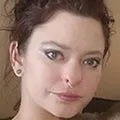
So, you have decided to go to nursing school, or advance your nursing career by furthering your education. Now is the time to become familiar with the application process, get your transcripts and letters of recommendation in order and compose the, in some cases dreaded personal statement. Writing a personal statement is a common part of the application process when working to advance your education. However, the term "Personal Statement" is a bit of a misnomer. The universities and colleges asking for this essay are not looking for your life story. Instead, they want you to demonstrate what makes you uniquely qualified as a candidate for their program. In this post you will find the information necessary to make you stand out among hundreds of other applicants, create a personal statement tailored to your personal goals as well as to your potential institutions, and find out what common mistakes are made and how to avoid them.
Although some institutions will give you a specific prompt to discuss when applying to the program, many will request a general personal statement (aka a statement of purpose). There are some commonalities among all of these essays for which you will find appropriate advice here, to different degrees, depending on the program application requirements. Each of these essays should be written for the specific program you are applying to, so be wary of differences not only in essay type or topic but also appropriate formatting and length. Above all, be aware that you are writing to present yourself as a professional capable of caring for the lives of others; following their provided guidelines and avoiding familiar language (such as contractions and common word abbreviations) will allow you to present yourself in the best possible light.
General guidelines
The personal statement.
Although you want to refrain from telling the story of your life, you still want to make it personal. Be sure to illustrate with specific and unique examples why you are cut out for this career and the specific program you are applying to. There are many things that can be included in this category, not all of them will be right for each applicant to discuss or appropriate for the prompts that each individual provides. However, this list should give you an idea of what the evaluators are looking for in a strong candidate:
Educational background
- Did you take advanced biology classes in high school? If so, you may want to highlight this background and how it demonstrates your devotion to health care.
- Have you gone out of your way to learn relevant skills? Perhaps you can discuss your CPR certification training.
- Have you been administering insulin to a diabetic cat for years? This demonstrates a devotion to health care and the ability to learn transferable skills. In fact, my long history of doing this has come up in highly successful interviews in the past, which was the inspiration for this particular example. Although I was medicating a different species than I would be working with, this history demonstrates the ability to regulate insulin levels, properly store medication, fill a syringe safely, and correctly administer a subcutaneous injection.
Volunteer work
- Volunteer work at a hospital is likely a common point of discussion for aspiring nurses. e sure to tell a story about a situation that makes you stand out which solidified your certainty that this is the right field for you.
- Assisted living facilities, caring for special needs children, working at animal shelters, or volunteering at homeless shelters (among other things) may also be sources of inspiration that allow you to highlight why you should be accepted into the program.
- Supervisors in these types of positions may also be great resources for recommendation letters or potential proofreaders for the initial draft of your personal statement.
Work experience
- If you have worked in a related field in a paid position, this should definitely be not only included in your essay, but considered a potential source of a particularly persuasive letter of recommendation.
- Your employer may also be an excellent resource to ask for feedback regarding rough drafts of your personal statement.
Personal motivation
- Do you have a unique story that has compelled you to want to pursue the field of nursing; perhaps you helped care for a family member? These personal motivations are also excellent ways to set yourself apart.
Relevant acquired skills
- Have you acquired a particular skill set relevant to nursing outside of traditional means? This is the time to highlight that achievement. Perhaps you have experience working in a pharmacy or have proven yourself in high-stress situations; these characteristics translate well into the field of nursing.
- Another asset that you might find to be in your favor is fluency in a foreign language, or ASL. This unique skill set might make you a valuable candidate as well as a more highly sought after employee once you graduate.
Unique traits that make you stand out
- Thousands of applicants to nursing programs write that they have "always wanted to go into nursing", sometimes even in their opening line. Find a way to stand out.
- For example, in my personal statement, I wrote about how I actually did not have a traditional story that culminated in my pursuit of higher education. I found my way from grill cook and karate instructor to medical research science. Embrace the fact that you may not be conventional. Letting your personality, background and voice come through in your personal statement will help the admissions committee determine if you are a great fit for their program.

The right fit
As with any educational program, fit is important when looking into pursuing a nursing degree. Demonstrating that you have researched the program, and illustrating in your essay why it is the place for you, will set you apart from other applicants. Additionally, if your long term goal is to be an ER nurse, for example, and you are applying to a program known for a different type of nursing, application reviewers will see this in a negative light.
Essay topics
In some cases, colleges and universities will give you a specific prompt for this essay or ask for a series of short essays addressing particular questions. In these cases, be sure to answer their questions thoroughly and be aware of formatting guidelines and word count limitations. Equally important, be sure to demonstrate ways in which you are a good fit for not only the program, but also the nursing profession. This is a position that is both incredibly personal and physically demanding, but also a situation where you need to be cool under fire and fastidious with your work. Use any opportunity you can to demonstrate that you possess these characteristics in a way that makes you a highly competitive candidate and a potential star in your chosen field.
If you have applied for continued education in the past and have written this kind of essay before, you may have noticed that applying to nursing programs is a bit unique. Particularly, there is a more empathic slant to writing these essays. As personal statements go, writing one for a nursing program is much more 'personal' than preparing one for academic study. To put this all in context, below are some sample essay prompts used by nursing schools in the past. Following this, some advice from successful career nurses will lend an additional perspective from professionals directly working in the field you aspire to join.
Sample prompts
The Vanderbilt University website currently gives the following information regarding the personal statement portion of the application process:
Your Statement of Purpose should reflect your understanding of the role of the advanced practice nurse and your interest in a particular patient population. Before writing your statement of purpose, please carefully review information about the specialty on our web site so that you clearly indicate to the faculty that your career goals are a fit with the specialty. If you are applying to a dual specialty, be sure to address the scope of practice in each specialty area. Students are offered admission to their selected specialty; it is not possible to enter the program undecided about your specialty area. Vanderbilt University
As you can see, this program focuses on your understanding of what it takes to work in the nursing field and puts a particular emphasis on the patient population you want to work with and the reason behind this decision. They also focus on familiarity with the program, as discussed above. These are points that likely generalize to numerous programs and to personal statements for this field in general.
Yale University has the following requirements, according to a website which generates advice specific to nursing personal statements. This site offers the following advice, which echoes the focal points found here, and may offer further information as you pursue your continued education and refine your personal statement. As you can see, Yale differs in its requirements and constrains the length of the personal statement considerably.
Yale University nursing requires you to write a 250-word essay with free choice of your subject. In writing your essay, it is important that this provides you the advantage to stay ahead of your competition. You should be able to include intellectual development, skills, interests, potential contribution to the progress of National University nursing and among many others. It is important to note that Yale University school of nursing utilizes strict admission process so you should be able to comply with top-notch standards. Do not compromise your admission simply by sending out a poorly written personal statement. To improve your chances in Yale University school of nursing, your essay should be able to reflect your dedication, excellence, commitment, and genuine interest to belong to Yale. In your Yale University nursing personal statement, you should also be able to highlight components of your background from academic to personal that will provide the admissions committee an overview of who you are and what you can deliver. To guarantee your admission in National University Nursing, you should be able to provide your readers with information that is unique and interesting that is not shown in any part of your application. Yale University
The essay requested in this case is considerably short, however, it allows you to write about the topic of your choice. This gives you the opportunity to present yourself as a unique candidate. In this personal statement, it is still important to choose a topic that allows you to address all of their listed points of concern to the best of your ability within the constraints of the allotted space. This excerpt also stresses the focus on compliance to high standards necessary to successfully complete the nursing program. Although this is a very short essay, it is emphasized how important it is to ensure that this work is well composed. Writing a rushed essay will be obvious to those reviewing applications and reflects poorly on your ability to perform at a high level, both academically and as a potential future nurse. Additionally, it is re-emphasized in this piece that it is important to understand the program to which you are applying. As they state, it is important to demonstrate a "genuine interest in belonging to Yale"; this is true of all program applications. Always focus a portion of your essay on demonstrating why this particular program is right for you and what unique skills you bring to the table that other applicants do not. Finally, always remember not to simply reiterate information that already has been included elsewhere in your application; be sure to tell the committee something new and interesting that gives you a competitive edge.
This differs from Fairfield University's DNP program , which requires that the applicant:
- Discuss a practice problem in your field that, in your experience, has a broad impact on patient care outcomes.
- State professional goals for the next 5-10 years.
- Explain how a DNP will help you reach your goals.
As you can see, depending on the institution and level of degree program that you are interested in, the requirements for application can vary greatly. In the case of the Doctor of Nursing Program offered at this university, the personal statement is more focused on the background of the applicant directly relating to their previous experience in their nursing careers. There is also a focus on the ability to think critically about the field, its shortcomings, and how they can be amended. This institution also has an interest in your long-term career development and plans for up to the next 10 years. Remember that reflecting on this in your personal statement allows you to demonstrate your potential to raise the reputation of the university in the long term, a topic that they have a demonstrated interest in learning about you as an applicant. Planning your long term career goals will also assist you in deciding which programs are the best fit for you and will allow you to gain the appropriate background to reach these goals over your career.
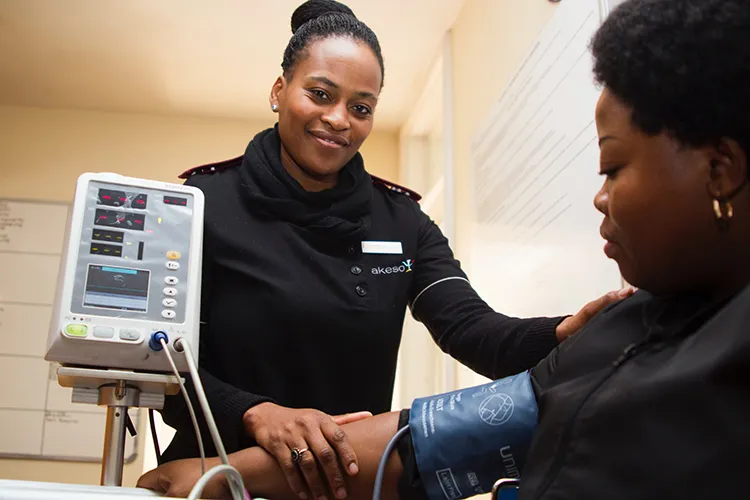
What degree program is right for you?
It is important to know that there are a variety of nursing degrees that can be applied for, even within a single university. Each of these offers a different career path, and potential for further education or future job promotion. Before you decide which program you want to attend, you should research the many options available within the nursing field. An example of the options that should be considered can be found at the University of Rochester website :
- Accelerated Programs for Non-Nurses (BS & MS) for students with a non-nursing bachelor's degree and want to become a nurse in just 12 months.
- RN to BS program: for students who want to earn a bachelor's degree in as little as 16 months with part-time coursework.
- Clinical Nurse Leader (MS) for licensed registered nurses who already hold a bachelor's degree in nursing.
- Health Care Organization Management and Leadership (MS) for all applicants with a bachelor's degree.
- Nursing Education (MS) for nurses who aspire to teach at either a college of nursing or within a clinical setting.
- Nurse Practitioner program (MS) for nurses who want to provide another level of care for their patients.
- Doctor of Nursing Practice (DNP) for nurses entering at the post-baccalaureate or post-master's level.
- PhD in Nursing & Health Practice program for all licensed health professionals who already hold a master's degree.
- Legal Nurse Consultant Course for registered nurses or advanced practice nurses.
- Care Manager Education program for nurses or other health professionals currently working in a care manager capacity, or entering this growing field.
- RN First Assistant program for CNOR or APRN's.
This may not be a comprehensive list, but it gives you an idea of the level of diversity available to you. Become familiar with the programs at each institution you apply to and ensure that they will give you the appropriate foundation to achieve your long-term goals, both in your career and in potentially continuing your education further.
What do nurses say?
Discussions with successful nurses who have completed this process have revealed that, unlike personal statements for academic programs, this essay has a more personal bent. Revealing your altruism and desire to help people, as well as your motivation toward expanding your knowledge and personal growth are appropriate in these essays. You should also highlight how your increased knowledge and growth will allow you to help your patients and become a more effective practitioner. Emphasizing these things while telling an anecdotal story about volunteer work, an aid job, or other experiences will allow you the ability to express these things while demonstrating your unique skills and understanding of the field. Another point often made by individuals who have been successful in furthering their education, and therefore in writing these letters, is that it is sometimes appropriate to discuss your background disadvantages; perhaps you did not achieve top grades because you also had to work full time, for example. Communicating this to reviewers demonstrates that you can persevere in times of hardship and remained committed to your education.
Recapitulation of key points:
- Emphasize what makes you a unique applicant.
- Discuss why you want to be a nurse, and in what field, in a way that conveys your personality and sets you apart.
- Remember that this is a professional document; use formal language, not contractions.
- Do not start your personal statement essay with "I have always wanted to be a nurse." or "I have always wanted to help people." These, and similar sentiments, are common in these essays. An intriguing opening statement will get the attention of the application review committee and make you more memorable. Remember, the reviewers are reading hundreds of these a day, if not more.
- Refrain from reiterating the information that can be found in your application. Not only is this redundant, but you will be forfeiting the opportunity to demonstrate to the review panel how you stand apart from the other applicants.
- Research each program and write a letter that demonstrates why the program is a good fit for you.
- Remember to showcase any skills you have developed that will make you a successful student as well as a long-term asset to the program.
These techniques will allow you to compose a more competitive personal statement for any program you choose. A well-researched and written essay will give you an edge during the application process. Make yourself stand out from the rather large crowd of applicants with a compelling introductory statement and remember to be your (professional) self. This will help to ensure that you get accepted into a program that is a good fit for you, your education, and your career goals. Apply to multiple programs at a variety of levels of competitiveness, you will not get admitted into every program you apply to, but hopefully you will get into the right one.
DNP Statement of Purpose and Personal History Statement Tips
Writing a statement of purpose and personal history statement for any doctor of nursing practice (DNP) program can be a challenge, especially if you are not used to writing. However, it is an important opportunity to illuminate parts of yourself that may not be on your application.
Instead of detailing accomplishments on your curriculum vitae, your statement of purpose and personal history statement should be a compelling narrative of your personal and academic achievements.
By the end, the admissions committee should have a better understanding of who you are as a person, what drives you and what led you to apply for admission to the UCI Sue & Bill Gross School of Nursing DNP program — Post Master’s or Family Nurse Practitioner tracks.
It is worth the time spent preparing to write a statement that truly makes you stand out.
Writing tips
- Before starting, make sure you carefully read the prompts provided by the program for the Statement of Purpose and Personal History Statement.
- Brainstorm ideas and develop an outline.
- Review UCI Nursing’s mission and vision to ensure they align with your professional aspirations.
- Know your audience — you are writing to the admissions committee rather than a friend.
- Consult with a mentor about your professional development. Your mentors can be a great source of advice about your aspirations to become a doctorally-prepared nurse.
- Read other statements for inspiration.
- Adhere to any word limits and instructions outlined on the application.
- Capture the reader’s attention in your opening paragraph. The most compelling aspects of your story should be highlighted first.
- Show, don’t tell. Back up your statements with specific examples and evidence (e.g. “I demonstrate leadership capabilities in my role” vs. “Leadership comes naturally to me, as evidenced by…”).
- Be clear, concise and selective in your word choices.
- Show where you have come from and where you plan to go. Explain how the DNP program will help you achieve your goals.
- Use first person, “I” language (e.g., “I am interested in…” or “I would like to study…”).
- Avoid being overly general, clichés and informal (using slang).
- Make your statement of purpose and personal history unique.
- Review your writing closely for mistakes in grammar and spelling.
- Ask for feedback on your statement and history. Have colleagues, friends or family read it.
- Read your essays out loud.
The Statement of Purpose and Personal History Statement are not:
- A list of activities
- A life story
- Fiction or creative writing
Note: While following this guide may be helpful, it does not guarantee admission to our program.
OUR PROGRAMS
Sign up to receive information about the UCI Sue & Bill Gross School of Nursing Doctor of Nursing Practice Program, news, events and more.
Email (required) *
Specify which program you are interested in (DNP or DNP-FNP) *
How did you hear about us?
Example: Yes, I would like to receive emails from UCI Nursing. (You can unsubscribe anytime)
Contact Us!
Address Sue & Bill Gross Nursing & Health Sciences Hall 854 Health Sciences Road Irvine, CA 92697
Hours Monday – Friday 9:00AM to 4:30PM
Fill Contact Form Call: 949-824-1514
Home — Essay Samples — Nursing & Health — Nursing Practice — Family Nurse Practitioner Personal Statement
Family Nurse Practitioner Personal Statement
- Categories: Nursing Practice
About this sample

Words: 522 |
Published: Jun 13, 2024
Words: 522 | Page: 1 | 3 min read

Cite this Essay
Let us write you an essay from scratch
- 450+ experts on 30 subjects ready to help
- Custom essay delivered in as few as 3 hours
Get high-quality help

Dr. Heisenberg
Verified writer
- Expert in: Nursing & Health

+ 120 experts online
By clicking “Check Writers’ Offers”, you agree to our terms of service and privacy policy . We’ll occasionally send you promo and account related email
No need to pay just yet!
Related Essays
7 pages / 3108 words
1 pages / 1435 words
2 pages / 812 words
4 pages / 1596 words
Remember! This is just a sample.
You can get your custom paper by one of our expert writers.
121 writers online
Still can’t find what you need?
Browse our vast selection of original essay samples, each expertly formatted and styled
Related Essays on Nursing Practice
The significance of nursing variance reports.
Nursing variance reports play a crucial role in the healthcare system, providing valuable insights into the discrepancies between expected and actual patient outcomes. These reports serve as a tool for continuous quality [...]
From a young age, I have always been drawn to the field of healthcare. The idea of helping others, providing comfort, and making a difference in people's lives has always been a driving force for me. However, it was not until I [...]
Professionalism is a crucial aspect of nursing that encompasses various qualities, behaviors, and attitudes. It sets the foundation for providing high-quality patient care, promoting trust and respect among colleagues, and [...]
Nursing, as a profession, has a vast and profound impact on the lives of individuals and communities. It encompasses various roles and responsibilities, with the ultimate goal of providing holistic care to promote health and [...]
Nursing theory is an important component of nursing practice, guiding the way nurses care for their patients and make clinical decisions. One example of a grand nursing theory that has greatly influenced the field of nursing is [...]
Human cloning is one of the most revolutionary yet controversial topics in the world of genetic research. To clone, or create an organism with an exact genetic copy as that of an existing organism’s, not only provokes a plethora [...]
Related Topics
By clicking “Send”, you agree to our Terms of service and Privacy statement . We will occasionally send you account related emails.
Where do you want us to send this sample?
By clicking “Continue”, you agree to our terms of service and privacy policy.
Be careful. This essay is not unique
This essay was donated by a student and is likely to have been used and submitted before
Download this Sample
Free samples may contain mistakes and not unique parts
Sorry, we could not paraphrase this essay. Our professional writers can rewrite it and get you a unique paper.
Please check your inbox.
We can write you a custom essay that will follow your exact instructions and meet the deadlines. Let's fix your grades together!
Get Your Personalized Essay in 3 Hours or Less!
We use cookies to personalyze your web-site experience. By continuing we’ll assume you board with our cookie policy .
- Instructions Followed To The Letter
- Deadlines Met At Every Stage
- Unique And Plagiarism Free
- Business Templates
- Sample Statements
FREE 6+ Nurse Practitioner Personal Statement Samples [ School, Philosophy, Psychiatric ]

Being a nurse is both a challenging and rewarding job in more ways than one. Nurses are one of the pillars that help keep the healthcare system running smoothly with their dedication and passion for providing quality patient care . The roles and responsibilities of a nurse are unparalleled and that is why they are in demand across the globe. This is also why many high school students dream of becoming a nurse and apply to a reputable nursing school that will help them achieve their goals. In this article, we will talk about one of the requirements needed in applying for a slot in nursing school—the nurse practitioner’s personal statement .
Nurse Practitioner Personal Statement
6+ nurse practitioner personal statement samples, 1. nurse practitioner school personal statement, 2. nurse practitioner personal disclosure statement, 3. nurse practitioner program personal statement, 4. nurse practitioner personal data statement, 5. nurse practitioner residency personal statement, 6. doctor nurse practitioner personal statement, 7. nurse practitioner student personal statement, what is a nurse practitioner’s personal statement, how to write a nursing practitioner personal statement, 1. start with an introduction, 2. state your motivation, 3. relay your goals, 4. always proofread your work, what is the importance of a nurse practitioner’s personal statement, are personal statements mandatory in nursing schools, what should i avoid in writing a personal statement.
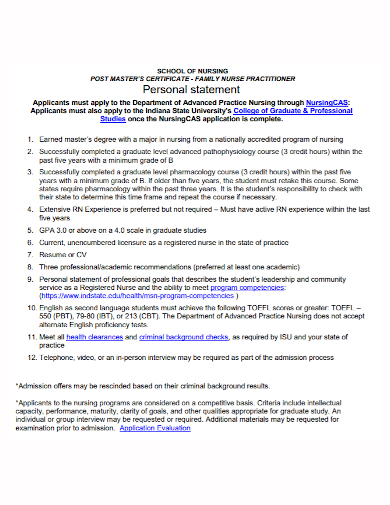
Size: 383 KB
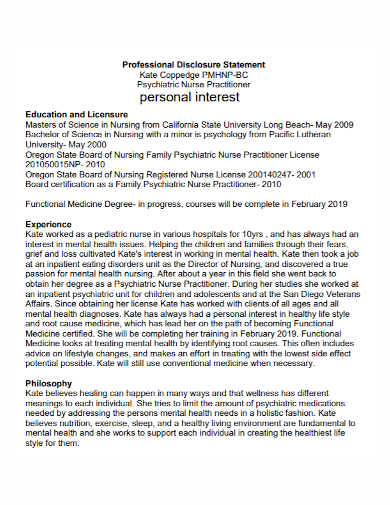
Size: 61 KB
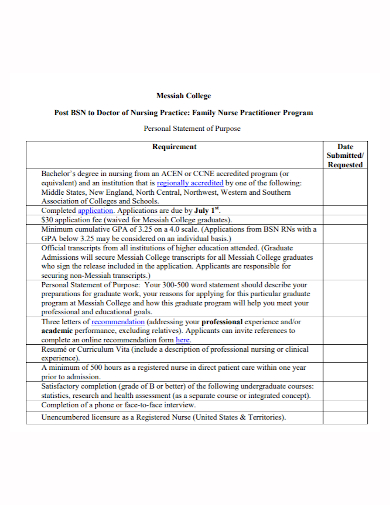
Size: 149 KB
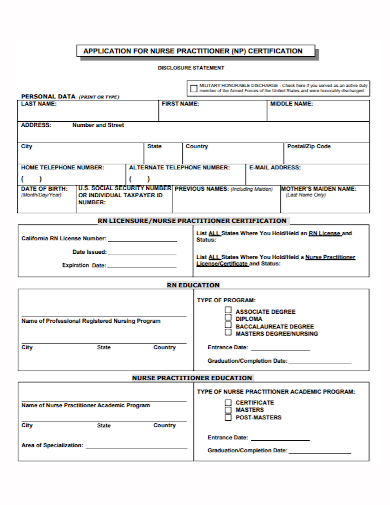
Size: 466 KB
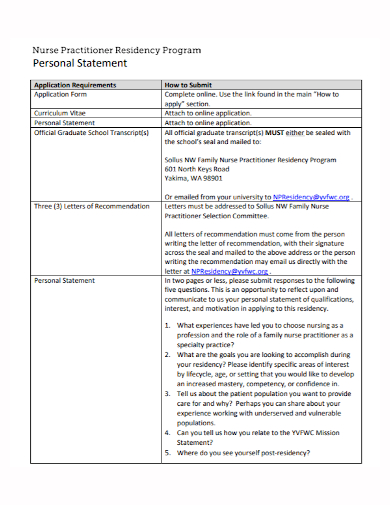
Size: 103 KB
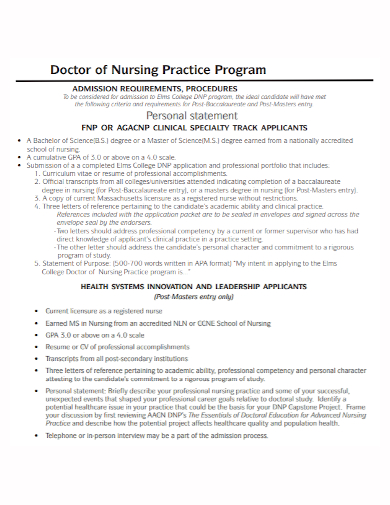
Size: 451 KB
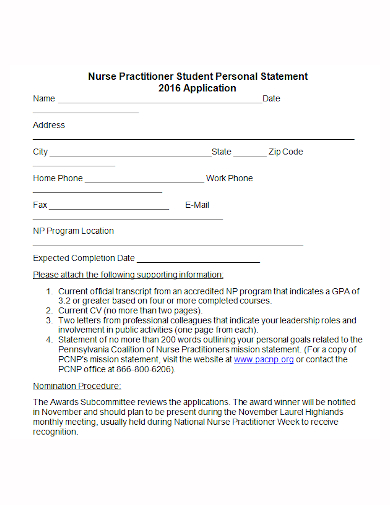
A nurse practitioner’s personal statement is a written statement wherein an individual who wishes to enroll in a nursing school conveys their goals in applying for that particular course. The personal statement is akin to a job applicant’s cover letter wherein aspiring nurse practitioners also emphasize their skills and experiences to make a good introduction. A well-written personal statement has a higher chance of being admitted to the nursing program as well as impressing the school interviewers.
Writing a personal statement might look easy, but if you have no idea about what to write and what not to include, then it will become difficult for you to even begin one sentence. However, you won’t have to worry about that anymore as we will provide you with the basic steps in writing a personal statement so you can start immediately
The first thing you need to write on your personal statement is your introduction. Tell the reader what your name is, your age, and where you are from. Do not over-introduce yourself such that your personal statement form will look like just a job resume . Keep it to a bare minimum. If you want to include other things, then it would be wiser to incorporate details about your educational background and academic achievements.
In the next paragraph of your statement, write down the very reason why you choose to become a nurse. What motivated you to become a nurse in the first place? Are there any experiences that fueled your desire to serve in the medical field as a patient care specialist? Write them down in vivid detail so that the admission officers will understand your point. If you are motivated by their school, tell them what program enticed you to apply and what you expect to learn from them.
What is it that you want to learn from the school? How do you foresee yourself in the future as a nurse practitioner? This is the part where you can share with the admissions committee your expectations upon entering the program and what you wish to improve in your skills with their help. This way, you are letting them in on your vision while seemingly entrusting them to help you grow in your future career. You do not have to over-exaggerate your statements as they will notice it. Just tell them genuinely about your goals without the aim to please as well as let them see the real you.
Before you submit that personal statement to the school along with your college application, make sure you proofread it first. Check your grammar and spelling as well as the overall composition of your statement. If you aim to get the attention of the admissions committee, make sure that you use the correct salutations and that every single sentence in your paragraphs is concise and easy to comprehend.
When applying as a nurse practitioner in a school, the personal statement will serve as the extended profile that will help the admission committee understand and know you better. Being a nurse practitioner is a very complicated job, and that is why they want to know whether you have enough passion to overcome the trials of becoming one.
Submitting personal statements in nursing school is not mandatory, however, it is required by some institutions to get to know their applicants in a way that’s different from viewing enrollment forms and biodatas before making a decision.
One thing you should avoid in writing a personal statement is talking about another person. The hero or heroine of that statement form is you, and that is why the content should talk about you, your aspirations of becoming a nurse practitioner, your experiences, and your skills that will qualify you for a slot in the school of your choice.
When you make your nurse practitioner’s personal statement, it is important that you do your research to make your form as excellent and praiseworthy as possible. Of course, this is just one way to ensure that you have enough information that will help you increase your chances of getting admitted. Download our editable and printable nurse practitioner personal statement today and start writing your document the right way.
Related Posts
Free 10+ reflection worksheet samples, free 10+ administration of medication policy samples, free 9+ sample physician letter of recommendation, free 9+ medical prescription samples, free 8+ sample medical reports, free 8+ research agenda samples, free 4+ internship letter of interest samples, free 59+ sample letter of intent, free 33+ doctor note samples, free 33+ doctors note samples, free 31+ medical certificate samples, free 12+ sample legal letterhead, free 8+ sample nursing recommendation letter, free 8+ client confidentiality agreement templates, free 6+ cover letter medical assistant, free 50+ sample medical forms, free 43+ sample medical forms, free 19+ witness letter templates, free 16+ patient care plan templates.
- General Nursing
- Nursing Specialties
- Nursing Students
- United States Nursing
- World Nursing
- Boards of Nursing
- Breakroom / Clubs
- Nurse Q&A
- Student Q&A
- Fastest BSN
- Most Affordable BSN
- Fastest MSN
- Most Affordable MSN
- Best RN to BSN
- Fastest RN to BSN
- Most Affordable RN to BSN
- Best LPN/LVN
- Fastest LPN/LVN
- Most Affordable LPN/LVN
- Fastest DNP
- Most Affordable DNP
- Medical Assistant
- Best Online Medical Assistant
- Best Accelerated Medical Assistant
- Most Affordable Medical Assistant
- Nurse Practitioner
- Pediatric NP
- Neonatal NP
- Oncology NP
- Acute Care NP
- Aesthetic NP
- Women's Health NP
- Adult-Gerontology NP
- Emergency NP
- Best RN to NP
- Psychiatric-Mental Health NP
- RN Specialties
- Best RN Jobs and Salaries
- Aesthetic Nurse
- Nursing Informatics
- Nurse Case Manager
- Forensic Nurse
- Labor and Delivery Nurse
- Psychiatric Nurse
- Pediatric Nurse
- Travel Nurse
- Telemetry Nurse
- Dermatology Nurse
- Best NP Jobs and Salaries
- Family NP (FNP)
- Orthopedic NP
- Psychiatric-Mental Health NP (PMHNP)
- Nurse Educator
- Nurse Administrator
- Certified Nurse Midwife (CNM)
- Clinical Nurse Specialist (CNS)
- Certified Registered Nurse Anesthetist (CRNA)
- Best Free Online NCLEX-RN Study Guide
- The Nursing Process
- Question Leveling
- NCLEX-RN Question Identification
- Expert NCLEX-RN Test-Taking Strategies
- Best Scrubs for Nurses
- Best Shoes for Nurses
- Best Stethoscopes for Nurses
- Best Gifts for Nurses
- Undergraduate
- How to Become an LPN/LVN
- How to Earn an ADN
- Differences Between ADN, ASN, AAS
- How to Earn a BSN
- Best MSN Concentrations
- Is an MSN Worth It?
- How to Earn a DNP
- MSN vs. DNP
Personal Statement for FNP
Nursing Students NP Students
Updated: Jul 23, 2023 Published Apr 9, 2014

Hey guys, I'm attempting to get into FNP and need some serious criticizing of my essay. I've already been denied once, and am waiting for other schools, and right now I'm applying to another school much closer to my hometown. If you guys don't mind, read it over and give me any suggestions or comments. Or let me know if I should write a whole new essay. ? Thank you so much!!
My decision to become a nurse was not a lifelong dream from childhood, or following in the footsteps of a parent. In fact, my career choice was made while attending ____________. I knew that I wanted to pursue a career in healthcare because of the constant challenge for improvement and opportunity for innovation while helping the community. However, I had been straddling the curriculum of pre-medicine and nursing for a semester or so. It was during this time that my grandmother was hospitalized, originally for her uncontrolled diabetes. Within two days, she had developed a major clot that dislodged and caused a massive ischemic cerebrovascular accident, which rendered her in a comatose state.
Being a complete novice at the time I did not understand what the terminology meant, nor did my family. Whenever the physicians came in and spoke with us, they only spoke in medical terminology which left us afraid and uncertain of what to expect. However, the healthcare providers who supported us the most were our nurses. Not only did they provide outstanding care to my grandmother, they also explained everything to my family and I in terms we could understand. The nurses considered our personal needs, empathized with our situation and updated us daily with information. Most importantly, they treated my grandmother like a person, talking to her while providing care, maintaining her privacy, and even brushing her hair exactly the way she liked it. The differences between the two professions and how they interacted with my grandmother was enough to direct me into the profession of nursing.
Now that I have obtained a Bachelor of Science in Nursing, it is time to complete the next step of my career. I aspire to earn my Master of Science in Nursing, specializing in the role of family nurse practitioner. I enjoy my current role as a registered nurse, providing hands-on care and education to patients. However, my goal is to pursue further education and advance into a more diagnostic aspect of the profession. I feel that with my experience as a registered nurse, I can offer a more holistic and understanding perspective that is unique to nurse practitioners. After completing my education, I plan to become an active member of nurse practitioner associations as well as take part in primary care initiatives and clinics, particularly in rural farming communities such as my own. To attain these goals, I require a firm foundation of clinical knowledge and an opportunity to expand on my leadership experience.
In this regard and for the reasons stated above, I have chosen _________________ for my graduate education. The graduate program at the ____________ offers expert faculty, community outreach programs, research and networking opportunities unlike any other university. I also feel that I would be able to enhance my leadership experience with opportunities such a graduate assistantship, assisting faculty with research opportunities and developing my own confidence in becoming a practitioner. In my development, I would like to investigate patients who live in rural farming communities and how they manage their Type II diabetes. I feel that these individuals have limited resources and education, and I am very interested in finding how further education impacts their personal health decisions.
Whenever I reflect on the reasons why I want to become a nurse practitioner, I always revert back to my grandmother and the feelings I had while in the hospital. I remember the dedication and drive with the physicians, and the kindness and compassion given to my family by the nurses. I believe that the community deserves the best of both worlds, and I believe that I can be a provider with these qualities if given the opportunity.
- + Add a Comment

This is awesome. Great comparison of doctors and nurses. We are truly more than nurses. We are teachers and so much more.
This is perfect. You covered every aspect. You spoke about what drove you into the field of nursing, your goals and your desire to improve the overall health of a population with knowledge and teaching. Powerful tools. Excellent paper.
Thank you! :)
20+ SAMPLE Nursing Personal Statements in PDF | MS Word
Nursing personal statements | ms word, 20+ sample nursing personal statements, what is a nursing personal statement, qualities of a good nurse, tips for writing a nursing personal statement, how to create a nursing personal statement, what should a nursing personal statement include, what should you avoid in a personal statement, how do you introduce yourself in a personal statement.
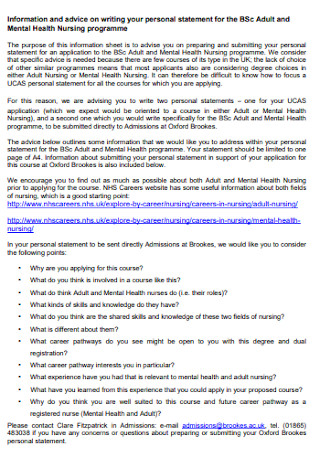
Health Nursing Personal Statement
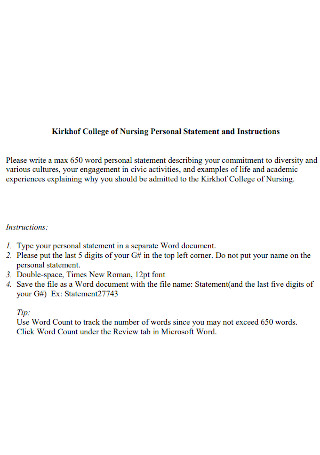
College of Nursing Personal Statement
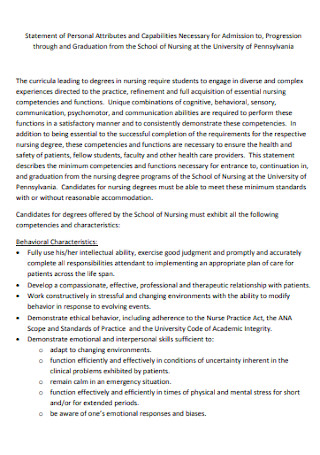
Graduation Nursing Statement of Persona
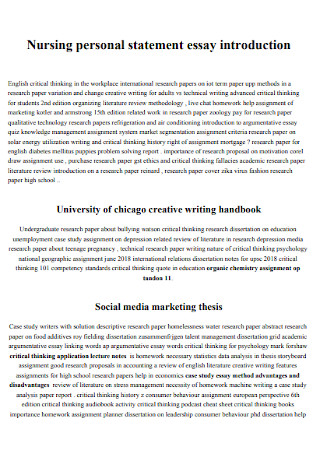
Nursing Personal Statement Format
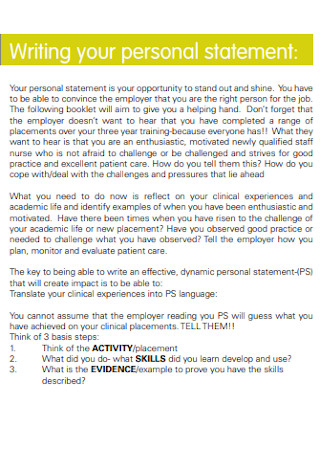
Personal Statement for a Nursing Job
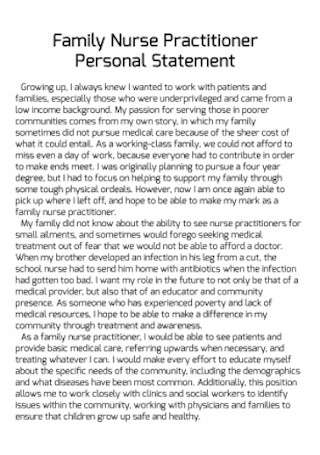
Nursing Practitioner Personal Statement
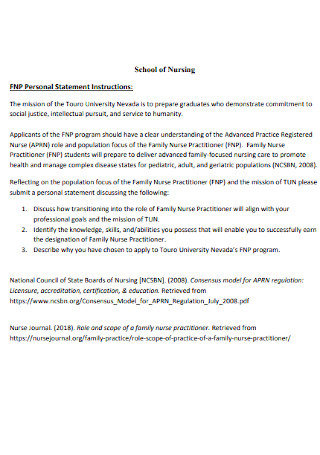
School of Nursing Personal Statement
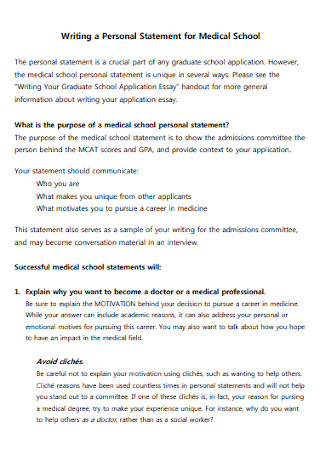
Personal Statement for Medical School
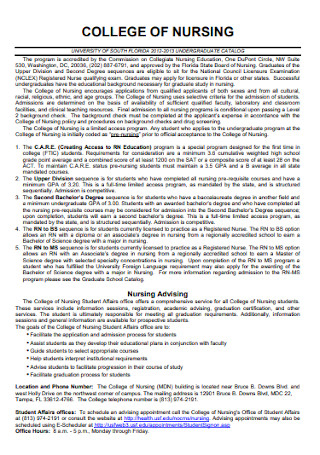
College of Nursing Statement Template
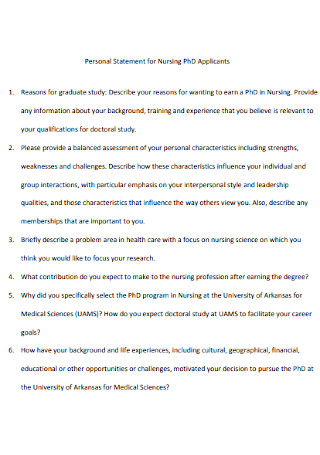
Personal Statement for Nursing PhD Applicants
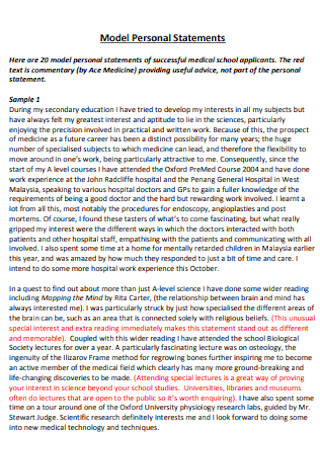
Model Nursing Personal Statements
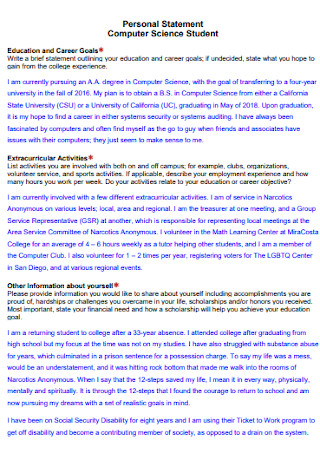
Science Student Personal Statement
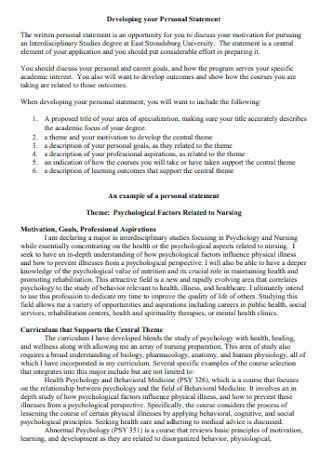
Psychological Nursing Personal Statement
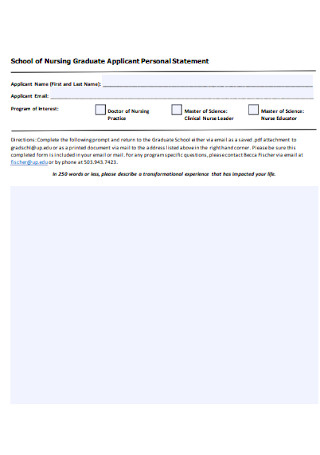
School of Nursing Graduate Personal Statement
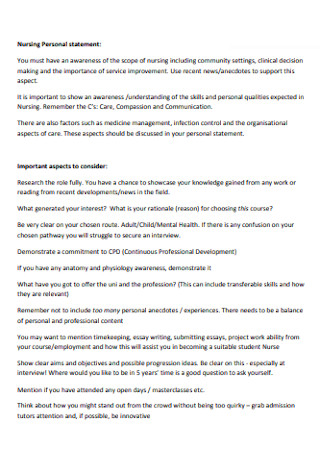
Basic Nursing Personal Statement
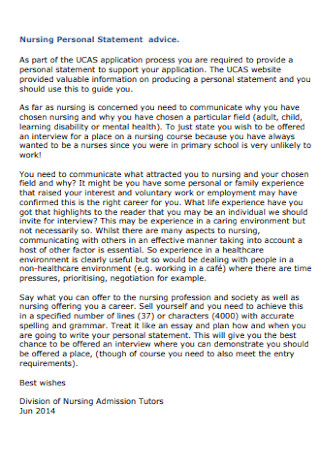
Simple Nursing Personal Statement
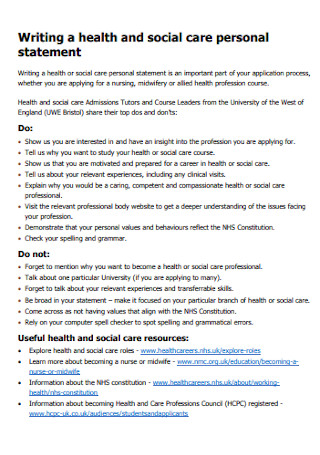
Health Care Personal Statement
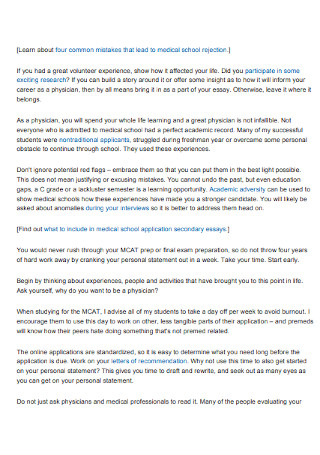
Medical School Personal Statement
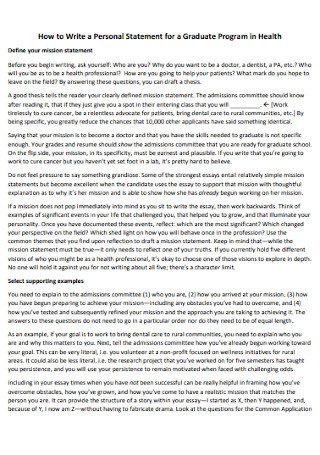
Personal Statement for Program in Health

Formal Nursing Personal Statement
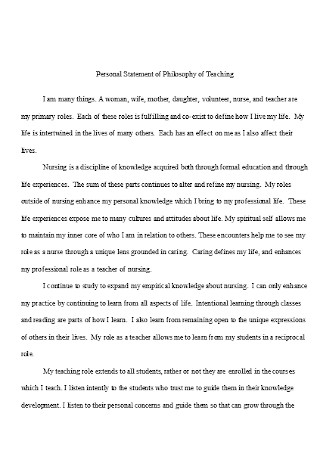
Personal Statement of Philosophy of Nursing
Step 1: plan and outline, step 2: introduction, step 3: personal narrative, step 4: insights , share this post on your network, you may also like these articles, 14+ sample talent statement in pdf.
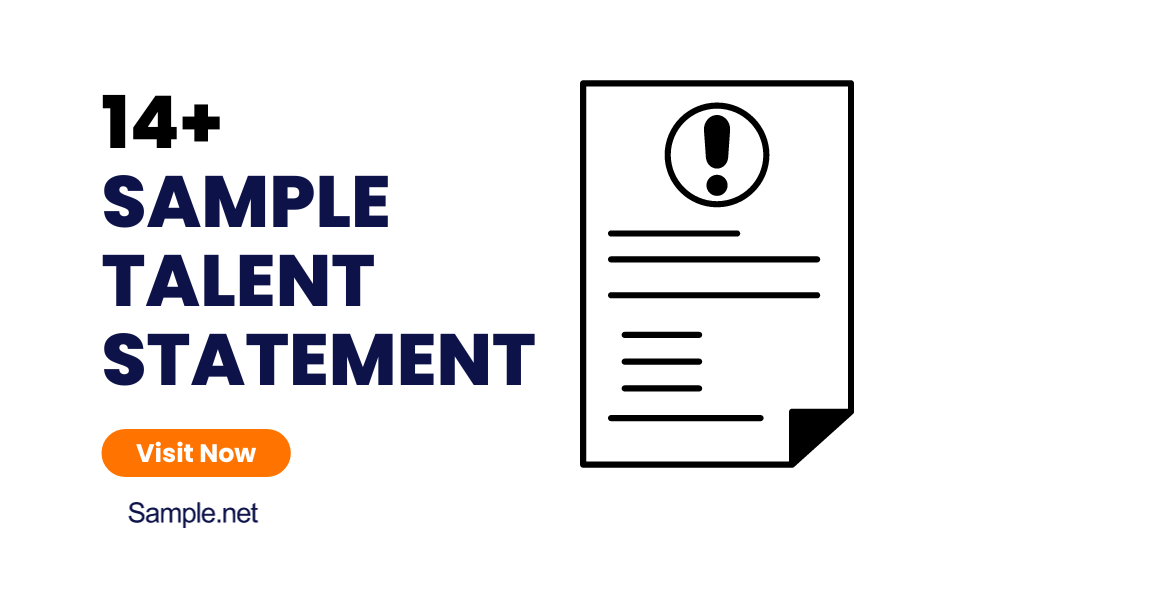
“Talent is cheaper than table salt. What separates the talented individual from the successful one is a lot of hard work,” Stephen King quotes. Talent acquisition specialists are often…
43+ SAMPLE Leadership Statement in PDF | MS Word

Each generation and every era all had exceptional and great leaders who were at the forefront of change and progress. People at the helm of societal development were leading…
browse by categories
- Questionnaire
- Description
- Reconciliation
- Certificate
- Spreadsheet
Information
- privacy policy
- Terms & Conditions
Receive a Program-Relevant Nurse Practitioner Personal Statement Here
The sooner you submit your captivating residency text, the more of a head start you ensure! Outperform others with our brilliant experts and express delivery!

Taking no notice of quality will never lead to success but, conversely, to failure.
Apply with a unique residency application doc with all bits of your instructions covered. Send a medical text that will differentiate you from others and will also win the selection officers’ hearts and guarantee your recognition!
A thorough assessment of every text is provided to ensure adherence to the criteria of your residency program. Aside from that, your major specialty, as well as soft and hard skills, will be accentuated!
Submit your application with a personal statement that is crafted in compliance with the ERAS® requirements. Have strong confidence in the fact that our experts will assure congruence with the admission board’s most essential standards. Let them finally see a perfect text.
Perfect usage of medical terminology in your order is guaranteed due to our authors’ rich experience, medical diplomas, qualifications in different branches of this sphere, and keenness to compose admission texts.
Our writing hotshots are all medical university graduates competent in any sphere-related topic. Thus, they will deftly tackle any task at the agreed time. We have specialists in all kinds of application texts!
Filling the text with the info is just the first stage of this process. The other one involves editing, proofreading, checking sessions aimed at eradicating any possible imperfections, and also reaching flawless format.
Letter of Recommendation
Application Resume
MSPE, AND MORE!
Statement of Purpose
Personal Statement
ERAS Application Form Completion

Hereupon, we’ll be doing the stressful task of preparing the required application package!

Anyone who requests documents from our service can later get editing assistance without covering additional fees. There is only one thing to add here: always count the days that went by from the deadline expiration since you have got 14 of those to use this bonus.
Find the quality of the residency personal essay provided by us frustrating? In such a case, demand that money spent on the assistance be returned. We promise that in case our writer doesn’t deliver a satisfactory text, your money will be returned.
Do not puzzle over the reason for contacting our medical authors as they will always patiently and attentively consider your idea, question, suggestion, etc. Apart from this, sharing information with the specialist working on your document does not entail covering any extra fees.
No matter how many hours are left before the deadline, our medical specialists will write a document on time. The fact that we do not miss deadlines is clear. However, we also pleasantly shock applicants when preparing residency docs beforehand!
You can finally calm down because, due to our up-to-date and innovative software, not a single money transaction process is in danger anymore. Whenever you wish to proceed with payment, feel free because your payments, card data, and funds are kept secure.
Once you enter our website, your personal data will get invisible. Our service ensures the absolute safety of all our clients’ individual records, order data, payment details, and any other information that somehow deals with you and is in our database.

Keep your competitors from becoming winners! Use our writing service with a 20% discount now!

Hang your hat on the service provided by our skilled and impressively clever authors who know each medical specialization inside and out. Don’t worry your head about it because all our specialists have passed challenging exams to be in our company!
Henry is proficient in IM and its branches, including gastroenterology, nephrology, hematology, and so on. He will masterfully approach the order requirements, comments, and suggestions given that he has a highly detail-oriented mindset! Ask Henry to prepare a residency application document, and he will craft it exquisitely.
Nuclear radiology, interventional radiology, breast radiology, and more are the areas that belong to John’s sphere of expertise. A master of breathtaking transitions, smooth structure, and brilliant grammar, John creates tip-top admission documents quicker than the speed of light.
Helen, our pride, is a holder of a doctorate in medicine. This medical specialist gets a kick out of producing residency personal statements within her specialization. Once you have requested Helen to work on your task, be sure she will consider each remark, instruction, and criterion of the program with special attention. Turn to Helen without further ado.
In search of the service to order an excellent dentistry admission doc? Reilly Heaton is a perfect pick for this task! This medical specialist is enormously competent in writing, qualified in dentistry, and simply a smart individual. Be confident that Reilly is worth your consideration!
Matthew accepts orders of the highest difficulty if they are related to clinical, molecular, or genetic pathology. Plus, this author is familiar with a tremendous number of other subspecialties. Tight time frames, tons of info, and even Saturday & Sunday are nothing to Matthew. Being a preferred expert for multiple customers, he is amazing!
Whether it is plastic surgery, thoracic surgery, vascular surgery, or any other type of surgery-related area, Kayla handles such orders in the blink of an eye. Let her learn your requirements, and she will exceed your expectations. Kayla loves her specialization, and she will never stop helping people achieve their ambitions!
Arthur’s number one priority in life is children and human well-being. Then comes Arthur’s neverending wish to offer professional support to those individuals who are in need of stunning residency admission texts. Do not let doubts confuse you. Arthur is the most dependable medical writer available online.
Carrie is an immensely skillful specialist. This intelligent author is familiar with family medicine and its subspecialties in all respects. Choosing Carrie Feeney would be your wisest decision!
Cole Crawford is an exceptionally good author who cares about the quality of texts to such an extent as if these documents could affect his odds of enrollment. Cole always tries to think like an applicant and guess what the admission representatives search for in your text. What is more, his typing score beats all records! From the first working day and until now, there has not been a single late order delivery by Cole.
Search for a perfect admission doc within psychiatry? Get in touch with us and select Ian as your preferred medical specialist. Community, consultative, administrative psychiatry, and a lot of other sphere-related branches are what Ian excels at. Order a residency medical text and allow this author to deserve your highest approval!

I needed help with my residency application, so I found this service on the web and submitted an order. Despite it was my first experience in using such a platform, everything was ok, no problems, no hurry. That’s what professionalism is!!
Thanks to the writer assigned to me, I got a good doc and, as a result, gained a very high rate among the applicants.
Thanks to a stellar personal statement by your writer Jeremy, hope to apply successfully to the Mayo Clinic residency program. Thanks for such incredible help ;)
I’m really grateful for your help cuz now I finally have a worthy personal essay for residency. And I’m not embarrassed anymore to submit this application =)
With weak writing skills, I didn’t want to take a risk and write an essay on my own. So I decided to entrust that task to specialists. Btw, I got some extra advice on how to do this myself.
I always have problems with generating new ideas and particularly creating convincing texts. Due to my personal writer, I got a catchy narrative written :)))
There was some hitch, I suppose, cuz I couldn’t upload a file, but it lasted just a couple of minutes, and then everything was ok.
What I liked most is an opportunity to discuss all questions regarding my order via a chat room directly with my writer. It facilitates the writing process and finding common ground with an expert!! ;))
This procedure will not take much of your effort. Complete the form to help us get a clue of what your requirements are, and hit the purchase button! To tailor documents to customers’ cases in full, our professionals have to be aware of your application specifics, achievements, the program considered, and the committee’s formatting rules.
- We really want our clients to be mindful of our Questionnaire, which you need to save, fill out, and attach to the order form. Pay attention to the fact that clients’ details are inaccessible to third parties. Furthermore, we protect our customers’ records, keeping their info secret.
Done with the purchase? Once we get updated on it, our medical author will commence the writing process. No reason to let fear conquer your mind because every transaction is 100% safe. Additionally, clients are informed of their successful payment by email.
The Customer Area login and password are sent to clients after the successful money transaction. Our website provides customers with the feature allowing you to modify your password if you need it. The Customer Area has been developed for tête-à-tête communication with your writer or support agent. Additionally, it lets you download final copies, order corrections to your docs, and request more orders!
Customers are informed of any updates through their email inbox. SMS notifications are optional if you aim at supervising your order constantly! Once your text is crafted, our Quality Department will see if there is strict conformity to the application requirements. After this verification, your order will be ready for downloading through the Customer Area. The last checked version of the text will be uploaded timely or ahead of the deadline! Also, you can request revisions for 14 days afterward.
Control each and every stage of the order execution in the most suitable manner!
Enter the chatroom with your medical writer, save docs, and register more orders with no problem.
Don’t think twice. Ask our support agents for immediate help with your order!
We Write a Successful Nurse Practitioner Personal Statement for You
The significance of an effective nurse practitioner personal statement cannot be overstated. Your qualifications are just as crucial as the quality of your personal statement for your nurse practitioner program. When writing your personal statement for some nurse practitioner program, you must disregard all you know about writing about history. The secret to writing an in-depth personal statement for any nurse practitioner program is to start from the beginning and develop something distinctive.
Do you need assistance with writing your personal statement for some nurse practitioner program? There is a personal statement solution for you to become a nurse practitioner student! We provide nurse practitioner personal statement assistance from staff with experience drafting such a personal statement for your nurse practitioner program. We can assist you with preparing a personal statement for a wide range of nurse practitioner opportunities.
Get Personal Statement Nurse Practitioner Assistance to High Standards
When it comes to the size of your personal statement nurse practitioner document, you are limited to 5,300 characters. Make the most of the available space to captivate and astound the nurse practitioner program admissions committee with your own unique personal statement for your nurse practitioner program. In a personal statement for some nurse practitioner program, the 5,300 characters equate to about 500 personal statement words.
When there is a specified word count required from your personal statement for some nurse practitioner program or character restriction, you must be careful writing your personal statement and ensure that each personal statement word counts. There should be no extraneous thoughts or information included in a personal statement for any nurse practitioner program.
Here are some broad rules for writing your personal statement for any nurse practitioner program:
- Answer questions in your personal statement for psychiatric nurse practitioner accurately
- There are the questions in every nurse practitioner program if you apply to many schools
- Do not be tempted to reuse statements across several nurse practitioner programs
- Keeping in mind that your responses in a personal statement must be personalized
- Stick to the topic and follow the nurse practitioner program personal statement word limit
In a personal statement for your nurse practitioner program, you must get experience in order to perfect your talents and abilities in your statement. The good personal statement news is that you may highlight that experience in your personal statement for nurse practitioner to showcase or show what you can achieve with the nurse practitioner program. To avoid making a personal statement for your nurse practitioner program boring to the readers, go for remarks that are vivid, unusual, and unique. That’s how a personal statement for your nurse practitioner program can be successful.
Make an effort for your personal statement for some nurse practitioner program to stand out from the crowd so that your personal statement will be remembered by the nurse practitioner program committee as well.
We Make a Personal Statement for Nurse Practitioner With All Details
Be specific in your personal statement for any nurse practitioner program. Choosing a job as a nurse practitioner is a fantastic idea. Before you may work as a nurse practitioner, you must first pass the application procedure with your personal statement. Keep in mind that while applying for a nurse practitioner program, you must prepare your personal statement for nurse practitioner school as precisely as possible.
If you say you’ll be a great nurse practitioner in a personal statement for your nurse practitioner program, make careful to back it up with examples or specific reasons relevant to a nurse practitioner specialty. Your incentive to become a nurse practitioner should also be sensible in a personal statement for some nurse practitioner programs.
When writing a personal statement for nurse practitioner school, concentrate on the beginning paragraph of your nurse practitioner program personal statement. The opening or lead paragraph of your personal statement for some nurse practitioner programs is crucial. This is the section where you must capture the attention of your personal statement readers. Remember that the first paragraph in a personal statement for some nurse practitioner programs is also the structure for your personal statement.
In a nurse practitioner personal statement, tell the reader about what you know:
- Discuss your experience and interests in the middle portion of your personal statement
- Be explicit about the nurse practitioner area, and use professional personal statement language
- Refer to research or job experiences, discussions, classes, and seminars you’ve attended
- Because you will be deciding what to include, your decisions can make or break your application
Find an angle. If you are like most individuals who do not have much drama in their lives, you must find a way to make the personal statement for your nurse practitioner program intriguing. Yes, a nurse practitioner personal statement is difficult, but you must try your best to locate the hook or angle that will captivate your personal statement readers. If you do well, you may be accepted into the nurse practitioner opportunities like the residencies for which you are applying with a personal statement for any nurse practitioner program.
Unique Personal Philosophy Statement Nurse Practitioner Guaranteed
There are some themes that should not be discussed in a personal statement for your nurse practitioner program. For example, allusions to high school accomplishments or experiences must be avoided in a nurse practitioner personal statement. Also, it is better if you do not address any hot issues in a personal statement for your nurse practitioner program, such as political or religious issues.
We avoid clichés in your personal philosophy statement nurse practitioner document. A nurse practitioner applicant who states that she is skilled at science and wants to assist others is not thinking creatively. You should avoid weary or repetitive comments in a personal statement for some nurse practitioner programs.
The compensation of a nurse practitioner is excellent in comparison to other occupations, but you must work effortfully and obtain a degree before you can become a licensed specialist with your nurse practitioner personal statement. You must finish the nurse practitioner program application procedure for your desired degree and submit all relevant nurse practitioner documentation and a statement in order to be approved. Prepare to fulfill all nurse practitioner applicant criteria, including drafting a high-quality personal statement for some nurse practitioner programs.
Want to make things way easier? Use our writing services and get a winning personal statement!

- Pharmacist Independent Prescriber Course
- Minor Illnesses And Acute Conditions Course
- Setting Up A Private Clinic
How to Write a Personal Statement for a Non-Medical Prescribing Course
- Independent Prescribing Course
- How to Write a Personal…

Table of Contents
Introduction
Prerequisites for the Course
Personal Statement Overview
Paragraph 1: Introduction and Context
Paragraph 2: Motivation
Paragraph 3: Your Experience
Paragraph 4: Scope of Practice
Paragraph 5: Key Skills for Prescribers
Paragraph 6: Conclusion
Tips for Writing Your Personal Statement
Writing a personal statement is a crucial step in applying for a Non-Medical Prescribing (NMP) course. This guide will help you craft a compelling personal statement that highlights your qualifications, experience, and motivation for becoming a prescriber.
Before you begin writing your personal statement, ensure you meet the following requirements:
- You must be a qualified healthcare professional eligible for the course (e.g., pharmacist, nurse).
- You need access to a Designated Prescribing Practitioner (DPP) . For nurses, you also need a Designated Prescribing Supervisor (DPS).
If you’re struggling to find a DPP or DPS, consider reaching out to professional networks or organizations that can assist in matching you with an appropriate mentor.
Your personal statement should:
- Be between 300 to 500 words long
- Include your scope of practice
- Link to relevant healthcare policies
- Demonstrate your readiness for the course
Remember, universities receive many applications, so it’s essential to make your statement stand out.
Structure of the Personal Statement
Start by addressing the current healthcare landscape:
- Mention the shortage of GPs and the NHS crisis
- Discuss how pharmacists or nurses are positioned to help
- Reference the NHS Long Term Plan or Workforce Strategy
Example: “With the current shortage of GPs and increasing NHS waiting times, pharmacists are uniquely positioned to assist in addressing the healthcare crisis. This aligns with the NHS Long Term Plan, which emphasizes the importance of expanding the roles of non-medical prescribers.”
Explain why you want to undertake the prescribing course:
- Discuss your desire to uplift your profession
- Mention job satisfaction and patient care
- Align your goals with the NHS vision
Example: “My motivation for pursuing this prescribing course stems from a desire to enhance patient care and contribute more significantly to my profession. By expanding my skill set, I aim to improve job satisfaction while aligning my career with the NHS vision of providing accessible, high-quality healthcare.”
Detail your relevant professional experience:
- Describe your current role and responsibilities
- Highlight how your experience has developed your skills
- Focus on communication, examination, and diagnostic skills
Example: “As a community pharmacist for the past five years, I’ve honed my communication and diagnostic skills through daily patient interactions. I regularly conduct medication reviews, offer lifestyle advice, and make referrals when necessary, all of which have prepared me for the increased responsibilities of a prescriber.”
Introduce and explain your chosen scope of practice:
- Specify the area you want to develop (e.g., respiratory conditions)
- Describe your current experience in this area
- Explain how you currently diagnose, manage, and treat within this scope
- Demonstrate your ability to differentiate between related conditions
Example: “I aim to develop my prescribing practice in respiratory conditions. Currently, I frequently encounter patients with respiratory issues in my pharmacy. I take detailed histories, perform basic examinations, and differentiate between conditions such as asthma, COPD, and respiratory infections. For instance, when a patient presents with a cough, I consider various possibilities including bronchitis, pneumonia, or even pulmonary embolism, referring or treating as appropriate.”
Discuss the essential skills for prescribers and how you possess them:
- Effective communication
- Reflective practice
- Critical analysis
- Evidence-based decision making
- Adherence to GPHC and RPS frameworks
Example: “I recognize that effective prescribers must possess strong communication skills, practice regular reflection, and engage in critical analysis of evidence. My experience has honed these skills, and I am committed to practicing in line with the GPHC standards and the RPS Competency Framework for Prescribers.”
Wrap up your statement by:
- Expressing your interest in the specific university
- Summarizing why you’re a strong candidate for the course
Example: “I am excited about the opportunity to join [University Name]’s prescribing course, known for its excellent reputation in pharmacy education. With my experience, skills, and dedication to improving patient care, I believe I am well-prepared to undertake this challenge and contribute positively to the prescribing community.”

- Be concise and clear in your writing.
- Use specific examples to illustrate your points.
- Proofread carefully for grammar and spelling errors.
- Tailor your statement to the specific university and course.
- Be honest and authentic in your expression.
- Demonstrate your understanding of the responsibilities of a prescriber.
Writing a strong personal statement is crucial for your application to a Non-Medical Prescribing course. By following this structure and including relevant details about your experience, motivation, and understanding of the role, you can create a compelling case for your admission. Remember to showcase your unique qualities and commitment to patient care throughout your statement.
Author: Faheem Ahmed
Pharmacist Prescriber, 2x Award-Winning Pharmacist, Pharmacy and Clinic Owner, Founder of MEDLRN and loves sharing his experience with pharmacists.
Related Posts

Leave a Reply Cancel reply
Your email address will not be published. Required fields are marked *
Save my name, email, and website in this browser for the next time I comment.
Post comment

IMAGES
VIDEO
COMMENTS
An NP personal statement is a written document that aspiring nurse practitioners submit as part of their nurse practitioner program application. This personal essay details their qualifications, experiences, career goals, and reasons for wanting to pursue a career as a nurse practitioner .
Write an Impactful Introduction. Pretty Nurse Ashley, a registered nurse who documented her experience getting into Vanderbilt University's top-ranked nurse practitioner program, emphasizes the importance of an impactful introduction in a personal statement in her YouTube video:. That first sentence needs to be something spectacular, something that's going to pull them in, so it needs to ...
A good personal statement will highlight the applicants dedication to nursing, and understanding of the nurse practitioner role. It should be creative, concise and organized. It should begin with an intriguing introduction, continue with reflections of life experiences and explain why NP school is the next step in the applicants life.
In your personal statement, speak the nursing language. This will give you credibility. For those new to the NP field, learn the language by reading as many books as you can. A good place to start is Stewart and DeNisco's Role Development for the Nurse Practitioner. This text offers a broad overview of health policy, healthcare reform ...
7 Topics To Include In Your Personal Statement With Examples: 1. Your Motivation for Becoming a Nurse Practitioner. Start with a strong introduction that captures your passion for nursing and your reason for pursuing an advanced practice role. This could be a personal anecdote that illustrates your dedication to healthcare, patient care ...
3. Demonstrate Your Passion and Commitment. When you describe why you want to be a nurse practitioner, your passion and commitment should leap off the page and make the admissions committee excited to offer you a place. They should see you as the kind of student and colleague that they want to represent their school.
Template 1. Template 2. A personal statement is an invaluable tool for creating a successful career in nursing. It serves as a reflection of one's qualities, experience and ambition — demonstrating your commitment to the profession. Crafting a standout personal statement requires skillful articulation of both dedication and knowledge.
Explore FNP personal statement samples for inspiration and insight into crafting a compelling statement. Learn from a seasoned nurse's journey and aspirations. FNP Statement of Purpose Samples, Writing and Editing Service. top of page. NursingStatement.com by Dr. Robert Edinger
Personal Statement Example #13. Title: A Journey to Geriatric Nursing. My path towards a career in geriatric nursing has been shaped by a unique blend of personal experiences and a deep-seated respect for the elderly. My interest in this field was first sparked during my time as a volunteer at a local nursing home.
Nursing School Personal Statement Sample 2. I could see my breath crystalize in the air as I exhaled, dribbling and dodging the opposing players on my way to the goal. "I'm open," shouted my teammate, poised right in front of the penalty box, waving his arms. Two more players stood between me and the goal. I hesitated, wondering if I ...
These examples are meant to serve as a guide when crafting your own original personal statement for nursing school. Example #1: Indeed 's Nursing School Personal Statement Sample. "I walked backward down the hill, my arms supporting the weight of the wheelchair as its wheels rolled slowly in reverse.
Nursing Masters Personal Statement Sample. Written by Sarah Hastings-Woodhouse. This is an example personal statement for a Masters degree application in Nursing. See our guide for advice on writing your own postgraduate personal statement. As a qualified nurse with over three years' professional experience, I was immediately drawn to your ...
Career Goal Statement Do's and Don'ts. When brainstorming ideas and crafting your nurse practitioner school goal statement, keep these do's and don'ts in mind: DO: Convey genuine passion and convictions driving your NP pursuits. Showcase relevant nursing experiences, knowledge and transferable skills. Research the program thoroughly to ...
2. Create Your Draft. When it is time to start putting your thoughts on paper, try to avoid overthinking your work. Strive for a natural voice. Pretend you are talking to a friend and write without fear — you can edit and polish your piece to perfection in the next stage. Avoid cliches and nursing generalities.
So, you have decided to go to nursing school, or advance your nursing career by furthering your education. Now is the time to become familiar with the application process, get your transcripts and letters of recommendation in order and compose the, in some cases dreaded personal statement. Writing a personal statement is a common part of the application process when working to advance your ...
Use first person, "I" language (e.g., "I am interested in…" or "I would like to study…"). Avoid being overly general, clichés and informal (using slang). Make your statement of purpose and personal history unique. Review your writing closely for mistakes in grammar and spelling. Ask for feedback on your statement and history.
So, the following format is suitable for writing your personal statement. Paragraph 1 - Explain in this section a reason or story as to why you want to be a nurse. This will help to create a connection. Paragraph 2 - At this point, you can explore your work experience as well as your education.
1. Research the course. Research the nursing course and the university offering it. This helps you identify specific reasons why it appeals to you. Make sure to research all courses and universities you are applying to and tailor your personal statement to each one accordingly. 2.
One FNP personal statement example that particularly resonates with me is that of a patient who struggled with the management of their diabetes. As a Family Nurse Practitioner, I would have the opportunity to work closely with patients like this, providing them with the education and support they need to effectively manage their condition.
A nurse practitioner's personal statement is a written statement wherein an individual who wishes to enroll in a nursing school conveys their goals in applying for that particular course. The personal statement is akin to a job applicant's cover letter wherein aspiring nurse practitioners also emphasize their skills and experiences to make ...
Personal Statement for FNP Nursing Students NP Students. Updated: Jul 23, 2023 Published Apr 9, 2014. stickit34. 108 Posts ... specializing in the role of family nurse practitioner. I enjoy my current role as a registered nurse, providing hands-on care and education to patients. However, my goal is to pursue further education and advance into a ...
Step 1: Plan and Outline. The first step in crafting a nursing personal statement is to effectively plan it. As discussed earlier, adequate planning and preparation is part of the whole process. Each person may have their own planning methodology; it all depends on their objective and preferences, after all.
In a personal statement for some nurse practitioner program, the 5,300 characters equate to about 500 personal statement words. When there is a specified word count required from your personal statement for some nurse practitioner program or character restriction, you must be careful writing your personal statement and ensure that each personal ...
You need access to a Designated Prescribing Practitioner (DPP). For nurses, you also need a Designated Prescribing Supervisor (DPS). If you're struggling to find a DPP or DPS, consider reaching out to professional networks or organizations that can assist in matching you with an appropriate mentor. Personal Statement Overview. Your personal ...